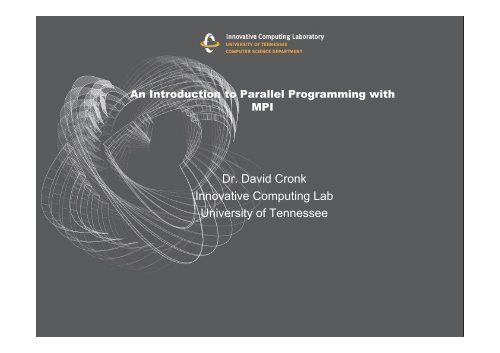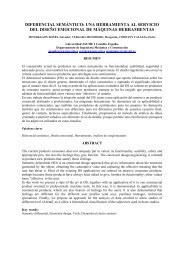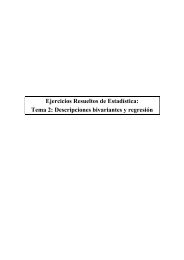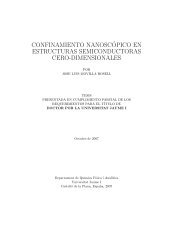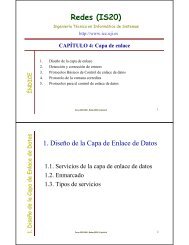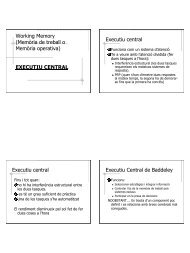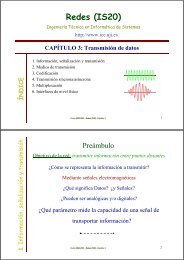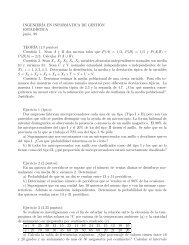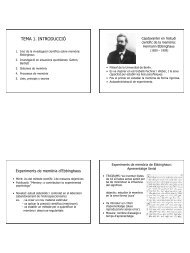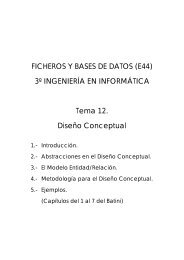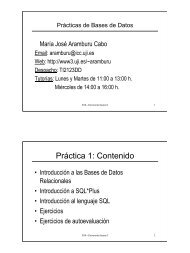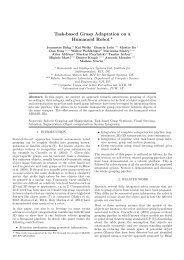Dr. David Cronk Innovative Computing Lab University of ... - It works!
Dr. David Cronk Innovative Computing Lab University of ... - It works!
Dr. David Cronk Innovative Computing Lab University of ... - It works!
You also want an ePaper? Increase the reach of your titles
YUMPU automatically turns print PDFs into web optimized ePapers that Google loves.
An Introduction to Parallel Programming with<br />
MPI<br />
<strong>Dr</strong>. <strong>David</strong> <strong>Cronk</strong><br />
<strong>Innovative</strong> <strong>Computing</strong> <strong>Lab</strong><br />
<strong>University</strong> <strong>of</strong> Tennessee
Day 1<br />
Morning - Lecture<br />
Course Outline<br />
Parallel Processing<br />
Parallel Programming<br />
Introduction to MPI<br />
Getting started with MPI<br />
Afternoon – <strong>Lab</strong><br />
Hands on exercises building and executing basic<br />
MPI programs<br />
<strong>David</strong> <strong>Cronk</strong> 2
Day 2<br />
Course Outline (cont)<br />
Morning – Lecture<br />
Communication Modes<br />
Collective communication<br />
Afternoon – <strong>Lab</strong><br />
Hands on exercises using various<br />
communication methods in MPI<br />
<strong>David</strong> <strong>Cronk</strong> 3
Course Outline (cont)<br />
Day 3<br />
Morning – Lecture<br />
Derived Datatypes<br />
What else is there<br />
Groups and communicators<br />
MPI-2<br />
Dynamic process management<br />
One-sided communication<br />
MPI-I/O<br />
Afternoon – <strong>Lab</strong><br />
Hands on exercises creating and using derived datatypes<br />
<strong>David</strong> <strong>Cronk</strong> 4
Day 1<br />
Morning - Lecture<br />
Course Outline<br />
Parallel Processing<br />
Parallel Programming<br />
Introduction to MPI<br />
Getting started with MPI<br />
Afternoon – <strong>Lab</strong><br />
Hands on exercises building and executing basic<br />
MPI programs<br />
<strong>David</strong> <strong>Cronk</strong> 5
Parallel Processing<br />
Outline<br />
› What is parallel processing<br />
› An example <strong>of</strong> parallel processing<br />
› Why use parallel processing<br />
<strong>David</strong> <strong>Cronk</strong> 6
Parallel Processing<br />
What is parallel processing<br />
› Using multiple processors to solve a single<br />
problem<br />
• Task parallelism<br />
– The problem consists <strong>of</strong> a number <strong>of</strong> independent<br />
tasks<br />
– Each processor or groups <strong>of</strong> processors can perform<br />
a separate task<br />
• Data parallelism<br />
– The problem consists <strong>of</strong> dependent tasks<br />
– Each processor <strong>works</strong> on a different part <strong>of</strong> data<br />
<strong>David</strong> <strong>Cronk</strong> 7
Parallel Processing<br />
1<br />
!<br />
0<br />
4<br />
_1_ x 2 dx= _<br />
_<br />
We can approximate the integral as a sum <strong>of</strong> rectangles<br />
N<br />
! F _x __x" _<br />
i<br />
i = 0<br />
<strong>David</strong> <strong>Cronk</strong> 8
Parallel Processing<br />
<strong>David</strong> <strong>Cronk</strong> 9
Parallel Processing<br />
<strong>David</strong> <strong>Cronk</strong> 10
Parallel Processing<br />
Why parallel processing<br />
› Faster time to completion<br />
• Computation can be performed faster with<br />
more processors<br />
› Able to run larger jobs or at a higher<br />
resolution<br />
• Larger jobs can complete in a reasonable<br />
amount <strong>of</strong> time on multiple processors<br />
• Data for larger jobs can fit in memory when<br />
spread out across multiple processors<br />
<strong>David</strong> <strong>Cronk</strong> 11
Day 1<br />
Morning - Lecture<br />
Course Outline<br />
Parallel Processing<br />
Parallel Programming<br />
Introduction to MPI<br />
Getting started with MPI<br />
Afternoon – <strong>Lab</strong><br />
Hands on exercises building and executing basic<br />
MPI programs<br />
<strong>David</strong> <strong>Cronk</strong> 12
Parallel Programming<br />
Outline<br />
› Programming models<br />
› Message passing issues<br />
• Data distribution<br />
• Flow control<br />
<strong>David</strong> <strong>Cronk</strong> 13
Parallel Programming<br />
Programming models<br />
› Shared memory<br />
• All processes have access to global memory<br />
› Distributed memory (message passing)<br />
• Processes have access to only local memory.<br />
Data is shared via explicit message passing<br />
› Combination shared/distributed<br />
• Groups <strong>of</strong> processes share access to “local”<br />
data while data is shared between groups via<br />
explicit message passing<br />
<strong>David</strong> <strong>Cronk</strong> 14
Parallel Programming<br />
Message Passing Issues<br />
› Data Distribution<br />
• Minimize overhead<br />
– Latency (message start up time)<br />
» Few large messages is better than many small<br />
– Memory movement<br />
• Maximize load balance<br />
– Less idle time waiting for data or synchronizing<br />
– Each process should do about the same work<br />
› Flow Control<br />
• Minimize waiting<br />
<strong>David</strong> <strong>Cronk</strong> 15
Data Distribution<br />
<strong>David</strong> <strong>Cronk</strong> 16
Data Distribution<br />
<strong>David</strong> <strong>Cronk</strong> 17
Flow Control<br />
0 1 2 3 4 5 ………<br />
Send to 1 Recv Send to from 2 0<br />
Send Recv to from 2 0<br />
Recv Send to from 3 1<br />
Send Recv to from 3 1<br />
Recv Send to from 4 2<br />
Send Recv to from 4 2<br />
<strong>David</strong> <strong>Cronk</strong> 18
Day 1<br />
Morning - Lecture<br />
Course Outline<br />
Parallel Processing<br />
Parallel Programming<br />
Introduction to MPI<br />
Getting started with MPI<br />
Afternoon – <strong>Lab</strong><br />
Hands on exercises building and executing basic<br />
MPI programs<br />
<strong>David</strong> <strong>Cronk</strong> 19
Introduction to MPI<br />
Outline<br />
› What is MPI<br />
• History<br />
• Origins<br />
• What MPI is not<br />
• Specifications<br />
• What’s new and in the future<br />
<strong>David</strong> <strong>Cronk</strong> 20
What is MPI<br />
Introduction to MPI<br />
› MPI stands for “Message Passing<br />
Interface”<br />
› In ancient times (late 1980’s early 1990’s)<br />
each vender had its own message passing<br />
library<br />
• Non-portable code<br />
• Not enough people doing parallel computing<br />
due to lack <strong>of</strong> standards<br />
<strong>David</strong> <strong>Cronk</strong> 21
What is MPI<br />
April 1992 was the beginning <strong>of</strong> the MPI forum<br />
› Organized at SC92<br />
› Consisted <strong>of</strong> hardware vendors, s<strong>of</strong>tware vendors,<br />
academicians, and end users<br />
› Held 2 day meetings every 6 weeks<br />
› Created drafts <strong>of</strong> the MPI standard<br />
› This standard was to include all the functionality<br />
believed to be needed to make the message<br />
passing model a success<br />
› Final version released may, 1994<br />
<strong>David</strong> <strong>Cronk</strong> 22
What is MPI<br />
A standard library specification!<br />
› Defines syntax and semantics <strong>of</strong> an extended<br />
message passing model<br />
› <strong>It</strong> is not a language or compiler specification<br />
› <strong>It</strong> is not a specific implementation<br />
› <strong>It</strong> does not give implementation specifics<br />
• Hints are <strong>of</strong>fered, but implementers are free to do things<br />
however they want<br />
• Different implementations may do the same thing in a<br />
very different manner<br />
› http://www.mpi-forum.org<br />
<strong>David</strong> <strong>Cronk</strong> 23
What is MPI<br />
A library specification designed to support<br />
parallel computing in a distributed memory<br />
environment<br />
› Routines for cooperative message passing<br />
• There is a sender and a receiver<br />
• Point-to-point communication<br />
• Collective communication<br />
› Routines for synchronization<br />
› Derived data types for non-contiguous data<br />
access patterns<br />
› Ability to create sub-sets <strong>of</strong> processors<br />
› Ability to create process topologies<br />
<strong>David</strong> <strong>Cronk</strong> 24
Continuing to grow!<br />
What is MPI<br />
› New routines have been added to replace<br />
old routines<br />
› New functionality has been added<br />
• Dynamic process management<br />
• One sided communication<br />
• Parallel I/O<br />
<strong>David</strong> <strong>Cronk</strong> 25
TAKE<br />
A<br />
BREAK<br />
<strong>David</strong> <strong>Cronk</strong> 26
Day 1<br />
Morning - Lecture<br />
Course Outline<br />
Parallel Processing<br />
Parallel Programming<br />
Introduction to MPI<br />
Getting started with MPI<br />
Afternoon – <strong>Lab</strong><br />
Hands on exercises building and executing basic<br />
MPI programs<br />
<strong>David</strong> <strong>Cronk</strong> 27
Getting Started with MPI<br />
Outline<br />
› Introduction<br />
› 6 basic functions<br />
› Basic program structure<br />
› Groups and communicators<br />
› A very simple program<br />
› Message passing<br />
› A simple message passing example<br />
› Types <strong>of</strong> programs<br />
• Traditional<br />
• Master/Slave<br />
• Examples<br />
› Unsafe communication<br />
<strong>David</strong> <strong>Cronk</strong> 28
Getting Started with MPI<br />
MPI contains 125 routines (more with the<br />
extensions)!<br />
Many programs can be written with just 6<br />
MPI routines!<br />
Upon startup, all processes can be<br />
identified by their rank, which goes from<br />
0 to N-1 where there are N processes<br />
<strong>David</strong> <strong>Cronk</strong> 29
6 Basic Functions<br />
MPI_INIT: Initialize MPI<br />
MPI_Finalize: Finalize MPI<br />
MPI_COMM_SIZE: How many processes<br />
are running<br />
MPI_COMM_RANK: What is my process<br />
number<br />
MPI_SEND: Send a message<br />
MPI_RECV: Receive a message<br />
<strong>David</strong> <strong>Cronk</strong> 30
MPI_INIT (ierr)<br />
ierr: Integer error return value. 0 on<br />
success, non-zero on failure.<br />
This MUST be the first MPI routine called<br />
in any program.<br />
Can only be called once<br />
Sets up the environment to enable<br />
message passing<br />
This is NOT how you run an MPI program<br />
<strong>David</strong> <strong>Cronk</strong> 31
MPI_FINALIZE (ierr)<br />
ierr: Integer error return value. 0 on success, non-zero<br />
on failure.<br />
This routine must be called by each process before it<br />
exits<br />
This call cleans up all MPI state<br />
No other MPI routines may be called after<br />
MPI_FINALIZE<br />
All pending communication must be completed (locally)<br />
before a call to MPI_FINALIZE<br />
There must be no unmatched communication calls<br />
when last process finalizes<br />
Only process with rank 0 is guaranteed to return<br />
<strong>David</strong> <strong>Cronk</strong> 32
Basic Program Structure<br />
program main<br />
include ‘mpif.h’<br />
integer ierr<br />
call MPI_INIT (ierr)<br />
………<br />
Do some work<br />
………<br />
call MPI_FINALIZE (ierr)<br />
Maybe do some additional<br />
serial computation if rank 0<br />
………………….<br />
end<br />
#include “mpi.h”<br />
int main ()<br />
{<br />
MPI_Init ()<br />
………<br />
Do some work<br />
………<br />
MPI_Finalize ()<br />
Maybe do some additional<br />
serial computation if rank 0<br />
………………….<br />
}<br />
<strong>David</strong> <strong>Cronk</strong> 33
Groups and communicators<br />
We will not be using this, but it is important to<br />
understand so you understand other routines<br />
Groups can be thought <strong>of</strong> as sets <strong>of</strong> processes<br />
These groups are associated with what are called<br />
“communicators”<br />
A communicator defines a “communication domain”<br />
Upon startup, there is a single set <strong>of</strong> processes<br />
associated with the communicator<br />
MPI_COMM_WORLD<br />
Groups can be created which are sub-sets <strong>of</strong> this<br />
original group, also associated with communicators<br />
<strong>David</strong> <strong>Cronk</strong> 34
MPI_COMM_RANK (comm, rank, ierr)<br />
comm: Communicator (integer in Fortran,<br />
MPI_Comm in C) . We will always use<br />
MPI_COMM_WORLD<br />
rank: Returned rank <strong>of</strong> calling process<br />
Between 0 and n-1 with n processes<br />
ierr: Integer error return code<br />
This routine returns the relative rank <strong>of</strong> the<br />
calling process, within the group associated<br />
with comm.<br />
<strong>David</strong> <strong>Cronk</strong> 35
MPI_COMM_SIZE (comm, size, ierr)<br />
Comm: Communicator handle<br />
Size: Upon return, the number <strong>of</strong><br />
processes in the group associated with<br />
comm. For our purposes, always the<br />
total number <strong>of</strong> processes<br />
This routine returns the number <strong>of</strong><br />
processes in the group associated with<br />
comm<br />
<strong>David</strong> <strong>Cronk</strong> 36
program main<br />
include ‘mpif.h’<br />
integer ierr, size, rank<br />
A Very Simple Program<br />
Hello World<br />
call MPI_INIT (ierr)<br />
call MPI_COMM_RANK (MPI_COMM_WORLD, rank, ierr)<br />
call MPI_COMM_SIZE (MPI_COMM_WORLD, size, ierr)<br />
print *, ‘Hello World from process’, rank, ‘<strong>of</strong>’, size<br />
call MPI_FINALIZE (ierr)<br />
end<br />
<strong>David</strong> <strong>Cronk</strong> 37
Hello World<br />
> mpirun –np 4 a.out<br />
><br />
> Hello World from 2 <strong>of</strong> 4<br />
> Hello World from 0 <strong>of</strong> 4<br />
> Hello World from 3 <strong>of</strong> 4<br />
> Hello World from 1 <strong>of</strong> 4<br />
> mpirun –np 4 a.out<br />
><br />
> Hello World from 3 <strong>of</strong> 4<br />
> Hello World from 1 <strong>of</strong> 4<br />
> Hello World from 2 <strong>of</strong> 4<br />
> Hello World from 0 <strong>of</strong> 4<br />
<strong>David</strong> <strong>Cronk</strong> 38
Message Passing<br />
Message passing is the transfer <strong>of</strong> data from<br />
one process to another<br />
› This transfer requires cooperation <strong>of</strong> the<br />
sender and the receiver, but is initiated by<br />
the sender<br />
› There must be a way to “describe” the data<br />
› There must be a way to identify specific<br />
processes<br />
› There must be a way to identify kinds <strong>of</strong><br />
messages<br />
<strong>David</strong> <strong>Cronk</strong> 39
Message Passing<br />
Data is described by a triple<br />
1. Address: Where is the data stored<br />
2. Datatype: What is the type <strong>of</strong> the data<br />
› Basic types (integers, reals, etc)<br />
› Derived types (good for non-contiguous data<br />
access)<br />
3. Count: How many elements make up the<br />
message<br />
<strong>David</strong> <strong>Cronk</strong> 40
Message Passing<br />
Processes are specified by a double<br />
1. Communicator: We will always use<br />
MPI_COMM_WORLD<br />
2. Rank: The relative rank <strong>of</strong> the specified<br />
process within the group associated with<br />
the communicator<br />
Messages are identified by a single tag<br />
This can be used to differentiate between<br />
different kinds <strong>of</strong> messages<br />
<strong>David</strong> <strong>Cronk</strong> 41
MPI_SEND(buf, cnt, dtype, dest,<br />
tag, comm, ierr)<br />
buf: The address <strong>of</strong> the beginning <strong>of</strong> the<br />
data to be sent<br />
cnt: The number <strong>of</strong> elements to be sent<br />
dtype: datatype <strong>of</strong> each element<br />
dest: The rank <strong>of</strong> the destination<br />
tag: Integer message tag<br />
0 >= tag >= MPI_TAG_UB (at least 32767)<br />
comm: The communicator<br />
<strong>David</strong> <strong>Cronk</strong> 42
MPI_STATUS<br />
Since a receive call only specifies the maximum<br />
number <strong>of</strong> elements to receive, there must be<br />
a way to find out the number <strong>of</strong> elements<br />
actually received<br />
MPI_Get_count (status, datatype, count, ierr)<br />
This routine returns in count the actual number <strong>of</strong><br />
elements received by a call that returned status<br />
MPI_STATUS_IGNORE can be used to avoid<br />
the overhead <strong>of</strong> filling in the status<br />
<strong>David</strong> <strong>Cronk</strong> 43
Send/Recv Example<br />
program main<br />
include ‘mpif.h’<br />
CHARACTER*20 msg<br />
integer ierr, rank, tag, status (MPI_STATUS_SIZE)<br />
tag = 99<br />
call MPI_INIT (ierr)<br />
call MPI_COMM_RANK (MPI_COMM_WORLD, rank, ierr)<br />
if (myrank .eq. 0) then<br />
msg = “Hello there”<br />
call MPI_SEND (msg, 11, MPI_CHARACTER, 1, tag, &<br />
MPI_COMM_WORLD, ierr)<br />
else if (myrank .eq. 1) then<br />
call MPI_RECV(msg, 20, MPI_CHARACTER, 0, tag, &<br />
MPI_COMM_WORLD, status, ierr)<br />
write (*,*) msg<br />
endif<br />
call MPI_FINALIZE (ierr)<br />
end<br />
<strong>David</strong> <strong>Cronk</strong> 44
Types <strong>of</strong> data parallel MPI<br />
Programs<br />
Peer/SPMD<br />
› Break the problem up into about even sized parts<br />
and distribute across all processors<br />
› What if problem is such that you cannot tell how<br />
much work must be done on each part<br />
Master/Slave<br />
› Break the problem up into many more parts than<br />
there are processors<br />
› Master sends work to slaves<br />
› Parts may be all the same size or the size may<br />
vary<br />
<strong>David</strong> <strong>Cronk</strong> 45
Data Distribution<br />
1-D block distribution<br />
2-D block block<br />
distribution<br />
2-D block cyclic<br />
distribution<br />
<strong>David</strong> <strong>Cronk</strong> 46
Peer/SPMD Example<br />
Compute the sum <strong>of</strong> a large array <strong>of</strong> N integers<br />
Comm = MPI_COMM_WORLD<br />
Call MPI_COMM_RANK (comm, rank, ierr)<br />
Call MPI_COMM_SIZE (comm, npes, ierr)<br />
Stride = N/npes<br />
Start = (stride * rank) + 1<br />
Sum = 0<br />
DO I = start, start+stride<br />
sum = sum + array(I)<br />
ENDDO<br />
If (rank .eq. 0) then<br />
DO I = 1, npes-1<br />
call MPI_RECV(tmp, 1, MPI_INTEGER,<br />
&<br />
I, 2, comm, status, ierr)<br />
sum = sum + tmp<br />
ENDDO<br />
ELSE<br />
MPI_SEND (sum, 1, MPI_INTEGER,<br />
& 0, 2 comm, ierr)<br />
ENDIF<br />
<strong>David</strong> <strong>Cronk</strong> 47
Master/Slave Example<br />
Do some computation for each <strong>of</strong> N elements in a large array.<br />
The amount <strong>of</strong> computation depends on the value <strong>of</strong> each element.<br />
Main<br />
Call MPI_INIT (ierr)<br />
comm = MPI_COMM_WORLD<br />
Call MPI_COMM_RANK (comm, rank, ierr)<br />
Call MPI_COMM_SIZE (comm, size, ierr)<br />
stride = N/(10*(size-1))<br />
If (rank .eq. 0)<br />
call master ()<br />
Else<br />
call slave()<br />
Endif<br />
Call MPI_FINALIZE (ierr)<br />
<strong>David</strong> <strong>Cronk</strong> 48
Master/Slave Example<br />
Master code:<br />
current = 1<br />
DO I = 1, size-1<br />
call MPI_SEND (info[current], stride<br />
&, MPI_INTEGER, I, 2, comm, ierr)<br />
current = current + stride<br />
ENDDO<br />
Do I = 1, 9*(size-1)<br />
call MPI_RECV (tmp, 0, MPI_BYTE,<br />
& MPI_ANY_SOURCE, 3, comm, status,ierr)<br />
source = status(MPI_SOURCE)<br />
call MPI_SEND (info[current], stride ,<br />
&<br />
MPI_INTEGER,<br />
&<br />
source, 2, comm, ierr)<br />
current = current + stride<br />
enddo<br />
Do I = 1, size-1<br />
call MPI_SEND (info, 0, MPI_INTEGER,<br />
& I, 4, comm, ierr)<br />
Enddo<br />
<strong>David</strong> <strong>Cronk</strong> 49
Master/Slave Example<br />
Slave code<br />
1 Call MPI_RECV (info, stride, MPI_INTEGER, 0, MPI_ANY_TAG, comm,<br />
&<br />
status, ierr)<br />
if (status(MPI_TAG) .eq. 4)<br />
goto 200<br />
do I =1, stride<br />
do_compute (array(I))<br />
enddo<br />
call MPI_SEND (tmp, 0, MPI_BYTE, 0, 3, comm, ierr)<br />
goto 100<br />
200 continue<br />
<strong>David</strong> <strong>Cronk</strong> 50
Master/Slave Example<br />
Master code:<br />
current = 1<br />
DO I = 1, size-1<br />
call MPI_SEND (info[current], stride<br />
&, MPI_INTEGER, I, 2, comm, ierr)<br />
current = current + stride<br />
ENDDO<br />
Do I = 1, 9*(size-1)<br />
call MPI_RECV (tmp, 0, MPI_BYTE,<br />
& MPI_ANY_SOURCE, 3, comm, status,ierr)<br />
source = status(MPI_SOURCE)<br />
call MPI_SEND (info[current], stride ,<br />
&<br />
MPI_INTEGER,<br />
&<br />
source, 2, comm, ierr)<br />
current = current + stride<br />
enddo<br />
Do (I = 1, size-1)<br />
call MPI_RECV (tmp, 0, MPI_BYTE, &<br />
I, 3, comm, status, ierr)<br />
call MPI_SEND (info, 0, MPI_INTEGER,<br />
& I, 4, comm, ierr)<br />
Enddo<br />
<strong>David</strong> <strong>Cronk</strong> 51
Unsafe Communication Patterns<br />
› Process 0 and process 1 must exchange data<br />
› Process 0 sends data to process 1 and then<br />
receives data from process 1<br />
› Process 1 sends data to process 0 and then<br />
receives data from process 0<br />
› If there is not enough system buffer space for<br />
either message, this will deadlock<br />
› Any communication pattern that relies on<br />
system buffers is unsafe<br />
› Any pattern that includes a cycle <strong>of</strong> blocking<br />
sends is unsafe<br />
<strong>David</strong> <strong>Cronk</strong> 52
Unsafe Communication Patterns<br />
send<br />
recv<br />
send<br />
recv<br />
send<br />
recv<br />
Potential<br />
deadlock<br />
Potential<br />
deadlock<br />
send<br />
recv<br />
send<br />
recv<br />
send<br />
recv<br />
<strong>David</strong> <strong>Cronk</strong> 53
Jacobi <strong>It</strong>eration<br />
0<br />
0<br />
M+1<br />
A<br />
exchange<br />
exchange<br />
exchange<br />
…….<br />
N+1<br />
<strong>David</strong> <strong>Cronk</strong> 54
Jacobi <strong>It</strong>eration<br />
Initializations<br />
.<br />
.<br />
DO WHILE (.NOT. Converged(A))<br />
.<br />
do iteration<br />
.<br />
.<br />
! Perform exchange<br />
IF (myrank .GT. 0) THEN<br />
CALL MPI_SEND (A(1,1), n, MPI_REAL, &<br />
myrank-1, tag, comm, ierr)<br />
ENDIF<br />
IF (myrank .LT. nprocs-1) THEN<br />
CALL MPI_SEND (A(1,m), n, MPI_REAL, &<br />
myrank+1, tag, comm, ierr)<br />
ENDIF<br />
IF (myrank .GT. 0) THEN<br />
CALL MPI_RECV (A(1,0), n, MPI_REAL, &<br />
myrank-1, tag, comm, status, ierr)<br />
ENDIF<br />
IF (myrank .LT. nprocs-1) THEN<br />
CALL MPI_RECV (A(1,m+1), n, MPI_REAL, &<br />
myrank+1, tag, comm, status, ierr)<br />
ENDIF<br />
ENDDO<br />
POTENTIAL DEADLOCK!<br />
<strong>David</strong> <strong>Cronk</strong> 55
Jacobi <strong>It</strong>eration<br />
! Perform exchange<br />
IF (MOD(myrank,2) .EQ. 1) THEN<br />
CALL MPI_SEND (A(1,1), n, MPI_REAL, &<br />
myrank-1, tag, comm, ierr)<br />
IF (myrank .LT. Nprocs-1) THEN<br />
CALL MPI_SEND (A(1,m), n, MPI_REAL, &<br />
myrank+1, tag, comm, ierr)<br />
ENDIF<br />
CALL MPI_RECV (A(1,0), n, MPI_REAL, &<br />
myrank-1, tag, comm, status, ierr)<br />
IF (myrank .LT. Nprocs-1) THEN<br />
CALL MPI_RECV (A(1,m+1), n, MPI_REAL, &<br />
myrank+1, tag, comm, status, ierr)<br />
ENDIF<br />
ENDIF<br />
ELSE<br />
IF (myrank .GT. 0) THEN<br />
CALL MPI_RECV (A(1,0), n, MPI_REAL, &<br />
myrank-1, tag, comm, status, ierr)<br />
ENDIF<br />
IF (myrank .LT. nprocs-1) THEN<br />
CALL MPI_RECV (A(1,m+1), n, MPI_REAL, &<br />
myrank+1, tag, comm, status, ierr)<br />
ENDIF<br />
IF (myrank .GT. 0) THEN<br />
CALL MPI_SEND (A(1,1), n, MPI_REAL, &<br />
myrank-1, tag, comm, ierr)<br />
ENDIF<br />
IF (myrank .LT. nprocs-1) THEN<br />
CALL MPI_SEND (A(1,m), n, MPI_REAL, &<br />
myrank+1, tag, comm, ierr)<br />
ENDIF<br />
ENDIF<br />
<strong>David</strong> <strong>Cronk</strong> 56
Day 2<br />
Course Outline (cont)<br />
Morning – Lecture<br />
Communication Modes<br />
Collective communication<br />
Afternoon – <strong>Lab</strong><br />
Hands on exercises using various<br />
communication methods in MPI<br />
<strong>David</strong> <strong>Cronk</strong> 57
Communication Modes<br />
Outline<br />
› Standard mode<br />
• Blocking<br />
• Non-blocking<br />
› Non-standard mode<br />
• Buffered<br />
• Synchronous<br />
• Ready<br />
› Performance issues<br />
<strong>David</strong> <strong>Cronk</strong> 58
Point-to-Point Communication<br />
Modes<br />
Standard Mode:<br />
blocking:<br />
MPI_SEND (buf, count, datatype, dest, tag, comm, ierr)<br />
MPI_RECV (buf, count, datatype, source, tag, comm, status, ierr)<br />
Generally ONLY use if you cannot call earlier AND there is no other<br />
work that can be done!<br />
Standard ONLY states that buffers can be used once calls return. <strong>It</strong><br />
is implementation dependant on when blocking calls return.<br />
Blocking sends MAY block until a matching receive is posted. This<br />
is not required behavior, but the standard does not prohibit this<br />
behavior either. Further, a blocking send may have to wait for<br />
system resources such as system managed message buffers.<br />
Be VERY careful <strong>of</strong> deadlock when using blocking calls!<br />
<strong>David</strong> <strong>Cronk</strong> 59
Point-to-Point Communication<br />
Modes (cont)<br />
Standard Mode:<br />
Non-blocking (immediate) sends/receives:<br />
MPI_ISEND (buf, count, datatype, dest, tag, comm, request, ierr)<br />
MPI_IRECV (buf, count, datatype, source, tag, comm, request, ierr)<br />
MPI_WAIT (request, status, ierr)<br />
MPI_WAITANY (count, requests, index, status, ierr)<br />
MPI_WAITALL (count, requests, statuses, ierr)<br />
MPI_TEST (request, flag, status, ierr)<br />
MPI_TESTANY (count, requests, index, flag, status, ierr)<br />
MPI_TESTALL (count, requests, flag, statuses, ierr)<br />
Allows communication calls to be posted early, which may improve<br />
performance.<br />
Overlap computation and communication<br />
Latency tolerance<br />
Less (or no) buffering<br />
* MUST either complete these calls (with wait or test) or<br />
call MPI_REQUEST_FREE<br />
<strong>David</strong> <strong>Cronk</strong> 60
MPI_ISEND (buf, cnt, dtype, dest,<br />
tag, comm, request, ierr)<br />
Same syntax as MPI_SEND with the addition <strong>of</strong><br />
a request handle<br />
Request is a handle (int in Fortran<br />
MPI_Request in C) used to check for<br />
completeness <strong>of</strong> the send<br />
This call returns immediately<br />
Data in buf may not be accessed until the user<br />
has completed the send operation<br />
The send is completed by a successful call to<br />
MPI_TEST or a call to MPI_WAIT<br />
<strong>David</strong> <strong>Cronk</strong> 61
MPI_IRECV(buf, cnt, dtype,<br />
source, tag, comm, request, ierr)<br />
Same syntax as MPI_RECV except status is<br />
replaced with a request handle<br />
Request is a handle (int in Fortran<br />
MPI_Request in C) used to check for<br />
completeness <strong>of</strong> the recv<br />
This call returns immediately<br />
Data in buf may not be accessed until the user<br />
has completed the receive operation<br />
The receive is completed by a successful call to<br />
MPI_TEST or a call to MPI_WAIT<br />
<strong>David</strong> <strong>Cronk</strong> 62
MPI_WAIT (request, status, ierr)<br />
Request is the handle returned by the nonblocking<br />
send or receive call<br />
Upon return, status holds source, tag, and error<br />
code information<br />
This call does not return until the non-blocking<br />
call referenced by request has completed<br />
Upon return, the request handle is freed<br />
If request was returned by a call to MPI_ISEND,<br />
return <strong>of</strong> this call indicates nothing about the<br />
destination process<br />
<strong>David</strong> <strong>Cronk</strong> 63
MPI_WAITANY (count, requests,<br />
index, status, ierr)<br />
Requests is an array <strong>of</strong> handles returned by nonblocking<br />
send or receive calls<br />
Count is the number <strong>of</strong> requests<br />
This call does not return until a non-blocking call<br />
referenced by one <strong>of</strong> the requests has completed<br />
Upon return, index holds the index into the array <strong>of</strong><br />
requests <strong>of</strong> the call that completed<br />
Upon return, status holds source, tag, and error code<br />
information for the call that completed<br />
Upon return, the request handle stored in<br />
requests[index] is freed<br />
<strong>David</strong> <strong>Cronk</strong> 64
MPI_WAITALL (count, requests,<br />
statuses, ierr)<br />
requests is an array <strong>of</strong> handles returned by nonblocking<br />
send or receive calls<br />
count is the number <strong>of</strong> requests<br />
This call does not return until all non-blocking<br />
call referenced by requests have completed<br />
Upon return, statuses hold source, tag, and<br />
error code information for all the calls that<br />
completed<br />
Upon return, the request handles stored in<br />
requests are all freed<br />
<strong>David</strong> <strong>Cronk</strong> 65
MPI_TEST (request, flag, status,<br />
ierr)<br />
request is a handle returned by a non-blocking<br />
send or receive call<br />
Upon return, flag will have been set to true if the<br />
associated non-blocking call has completed.<br />
Otherwise it is set to false<br />
If flag returns true, the request handle is freed<br />
and status contains source, tag, and error<br />
code information<br />
If request was returned by a call to MPI_ISEND,<br />
return with flag set to true indicates nothing<br />
about the destination process<br />
<strong>David</strong> <strong>Cronk</strong> 66
MPI_TESTANY (count, requests,<br />
index, flag, status, ierr)<br />
requests is an array <strong>of</strong> handles returned by nonblocking<br />
send or receive calls<br />
count is the number <strong>of</strong> requests<br />
Upon return, flag will have been set to true if<br />
one <strong>of</strong> the associated non-blocking call has<br />
completed. Otherwise it is set to false<br />
If flag returns true, index holds the index <strong>of</strong> the<br />
call that completed, the request handle is<br />
freed, and status contains source, tag, and<br />
error code information<br />
<strong>David</strong> <strong>Cronk</strong> 67
MPI_TESTALL (count, requests,<br />
flag, statuses, ierr)<br />
requests is an array <strong>of</strong> handles returned by nonblocking<br />
send or receive calls<br />
count is the number <strong>of</strong> requests<br />
Upon return, flag will have been set to true if<br />
ALL <strong>of</strong> the associated non-blocking call have<br />
completed. Otherwise it is set to false<br />
If flag returns true, all the request handles are<br />
freed, and statuses contains source, tag, and<br />
error code information for each operation<br />
<strong>David</strong> <strong>Cronk</strong> 68
Non-blocking Communication<br />
100 continue<br />
if (err .lt. Delta) goto 200<br />
do some computation<br />
do I = 0, npes<br />
if (I .ne. myrank)<br />
set up data to send<br />
call MPI_SEND (sdata(I), cnt, dtype, &<br />
I, tag, comm, ierr)<br />
endif<br />
enddo<br />
do I = 0, npes<br />
if (I .ne. myrank)<br />
set up data to recv<br />
call MPI_RECV (rdata(I), cnt, dtype, &<br />
I, tag, comm, status, ierr)<br />
endif<br />
enddo<br />
goto 100<br />
Clearly unsafe<br />
100 continue<br />
if (err .lt. Delta) goto 200<br />
do some computation<br />
do I = 0, npes<br />
if (I .ne. myrank)<br />
set up data to send<br />
call MPI_ISEND (sdata(I), cnt, dtype, &<br />
I, tag, comm, request, ierr)<br />
endif<br />
enddo<br />
do I = 0, npes<br />
if (I .ne. myrank)<br />
set up data to recv<br />
call MPI_RECV (rdata(I), cnt, dtype, &<br />
I, tag, comm, status, ierr)<br />
endif<br />
enddo<br />
goto 100<br />
May run out <strong>of</strong> handles<br />
<strong>David</strong> <strong>Cronk</strong> 69
Non-blocking Communication<br />
100 continue<br />
…….<br />
J = 0<br />
do I = 0, npes<br />
if (I .ne. myrank)<br />
J = J+1<br />
set up data to send<br />
call MPI_ISEND (sdata(I), cnt, dtype, &<br />
I, tag, comm, request(J), ierr)<br />
endif<br />
enddo<br />
call MPI_WAITALL (npes-1, request,<br />
&<br />
………<br />
receive data<br />
………..<br />
Unsafe again<br />
statuses, ierr)<br />
100 continue<br />
………..<br />
J = 0<br />
do I = 0, npes<br />
if (I .ne. myrank)<br />
J = J+1<br />
set up data to send<br />
call MPI_ISEND (sdata(I), cnt, dtype, &<br />
I, tag, comm, request(J), ierr)<br />
endif<br />
enddo<br />
…………<br />
receive data<br />
………….<br />
call MPI_WAITALL (npes-1, request,<br />
&<br />
statuses, ierr)<br />
Safe…….but<br />
<strong>David</strong> <strong>Cronk</strong> 70
Non-blocking communication<br />
J = 0<br />
do I = 0, npes<br />
if (I .ne. myrank)<br />
J = J+1<br />
call MPI_ISEND (sdata(I), cnt, dtype, &<br />
I, tag, comm, s_request[J], ierr)<br />
endif<br />
enddo<br />
J = 0<br />
do (I = 0, npes)<br />
if (I .ne. myrank)<br />
J = J+1<br />
call MPI_IRECV (rdata(I), cnt, dtype, &<br />
I, tag, comm, r_request[J], ierr)<br />
endif<br />
enddo<br />
call MPI_WAITALL (…, s_request, …)<br />
call MPI_WAITALL (…, r_request, …)<br />
Safe, and pretty good<br />
<strong>David</strong> <strong>Cronk</strong> 71
Jacobi <strong>It</strong>eration<br />
0<br />
0<br />
M+1<br />
A<br />
exchange<br />
exchange<br />
exchange<br />
…….<br />
N+1<br />
<strong>David</strong> <strong>Cronk</strong> 72
Jacobi <strong>It</strong>eration<br />
IF (myrank .EQ. 0) THEN<br />
left = MPI_PROC_NULL<br />
ELSE<br />
left = myrank-1<br />
ENDIF<br />
IF (myrank .EQ. nprocs) THEN<br />
right = MPI_NULL_PROC<br />
ELSE<br />
right = myrank+1<br />
.<br />
.<br />
Compute boundary columns<br />
.<br />
.<br />
! Perform exchange<br />
CALL MPI_ISEND (A(1,1), n, MPI_REAL, &<br />
left, tag, comm, requests(1), ierr)<br />
CALL MPI_ISEND (A(1,m), n, MPI_REAL, &<br />
right, tag, comm, requests(2), ierr)<br />
CALL MPI_IRECV (A(1,0), n, MPI_REAL, &<br />
left, tag, comm, requests(3), ierr)<br />
CALL MPI_IRECV (A(1,m+1), n, MPI_REAL, &<br />
right, tag, comm, requests(4), ierr)<br />
.<br />
.<br />
Compute interior<br />
.<br />
.<br />
CALL MPI_WAITALL (4, requests, statuses, ierr)<br />
<strong>David</strong> <strong>Cronk</strong> 73
Point-to-Point Communication<br />
Modes (cont)<br />
Non-standard mode communication<br />
› Only used by the sender! (MPI uses the<br />
push communication model)<br />
› Buffered mode - A buffer must be provided<br />
by the application<br />
› Synchronous mode - Completes only after<br />
a matching receive has been posted<br />
› Ready mode - May only be called when a<br />
matching receive has already been posted<br />
<strong>David</strong> <strong>Cronk</strong> 74
Point-to-Point Communication<br />
Modes: Buffered<br />
MPI_BSEND (buf, count, datatype, dest, tag, comm, ierr)<br />
MPI_IBSEND (buf, count, dtype, dest, tag, comm, req, ierr)<br />
MPI_BUFFER_ATTACH (buff, size, ierr)<br />
MPI_BUFFER_DETACH (buff, size, ierr)<br />
Buffered sends do not rely on system buffers<br />
The user supplies a buffer that MUST be large enough for all<br />
messages<br />
User need not worry about calls blocking, waiting for system<br />
buffer space<br />
The buffer is managed by MPI<br />
The user MUST ensure there is no buffer overflow<br />
<strong>David</strong> <strong>Cronk</strong> 75
Buffered Sends<br />
#define BUFFSIZE 1000<br />
char *buff;<br />
char b1[500], b2[500]<br />
MPI_Buffer_attach (buff, BUFFSIZE);<br />
Seg violation<br />
#define BUFFSIZE 1000<br />
char *buff;<br />
char b1[500], b2[500];<br />
buff = (char*) malloc(BUFFSIZE);<br />
MPI_Buffer_attach(buff, BUFFSIZE);<br />
MPI_Bsend(b1, 500, MPI_CHAR, 1, 1,<br />
MPI_COMM_WORLD);<br />
MPI_Bsend(b2, 500, MPI_CHAR, 2, 1,<br />
MPI_COMM_WORLD);<br />
Buffer overflow<br />
int size;<br />
char *buff;<br />
char b1[500], b2[500];<br />
MPI_Pack_size (500, MPI_CHAR,<br />
MPI_COMM_WORLD, &size);<br />
size += MPI_BSEND_OVERHEAD;<br />
size = size * 2;<br />
buff = (char*) malloc(size);<br />
MPI_Buffer_attach(buff, size);<br />
MPI_Bsend(b1, 500, MPI_CHAR, 1, 1,<br />
MPI_COMM_WORLD);<br />
MPI_Bsend(b2, 500, MPI_CHAR, 2, 1,<br />
MPI_COMM_WORLD);<br />
MPI_Buffer_detach (&buff, &size);<br />
Safe<br />
<strong>David</strong> <strong>Cronk</strong> 76
Point-to-Point Communication<br />
Modes: Synchronous<br />
MPI_SSEND (buf, count, datatype, dest, tag, comm, ierr)<br />
MPI_ISSEND (buf, count, dtype, dest, tag, comm, req, ierr)<br />
Can be started (called) at any time.<br />
Does not complete until a matching receive has been posted<br />
and the receive operation has been started<br />
* Does NOT mean the matching receive has completed<br />
Can be used in place <strong>of</strong> sending and receiving<br />
acknowledgements<br />
Can be more efficient when used appropriately<br />
buffering may be avoided<br />
<strong>David</strong> <strong>Cronk</strong> 77
Point-to-Point Communication<br />
Modes: Ready Mode<br />
MPI_RSEND (buf, count, datatype, dest, tag, comm, ierr)<br />
MPI_IRSEND (buf, count, dtype, dest, tag, comm, req, ierr)<br />
May ONLY be started (called) if a matching receive has already<br />
been posted.<br />
If a matching receive has not been posted, the results are<br />
undefined<br />
May be most efficient when appropriate<br />
Removal <strong>of</strong> handshake operation<br />
Should only be used with extreme caution<br />
<strong>David</strong> <strong>Cronk</strong> 78
Ready Mode<br />
SLAVE<br />
MASTER<br />
while (!done) {<br />
MPI_Recv (NULL, 0, MPI_INT, MPI_ANYSOURCE,<br />
1, MPI_COMM_WORLD, &status);<br />
source = status.MPI_SOURCE;<br />
get_work (…..);<br />
MPI_Rsend (buff, count, datatype, source, 2,<br />
MPI_COMM_WORLD);<br />
if (no more work) done = TRUE;<br />
}<br />
while (!done) {<br />
MPI_Send (NULL, 0, MPI_INT, MASTER,<br />
1, MPI_COMM_WORLD);<br />
MPI_Recv (buff, count, datatype, MASTER,<br />
2, MPI_COMM_WORLD, &status);<br />
…<br />
}<br />
UNSAFE<br />
while (!done) {<br />
MPI_Irecv (buff, count, datatype, MASTER,<br />
2, MPI_COMM_WORLD, &request);<br />
MPI_Ssend (NULL, 0, MPI_INT, MASTER,<br />
1, MPI_COMM_WORLD);<br />
MPI_Wait (&request, &status);<br />
…<br />
}<br />
SAFE<br />
<strong>David</strong> <strong>Cronk</strong> 79
Point-to-Point Communication<br />
Modes: Performance Issues<br />
› Non-blocking calls are almost always the way to go<br />
› Communication can be carried out during blocking system<br />
calls<br />
› Computation and communication can be overlapped if there<br />
is special purpose communication hardware<br />
› Less likely to have errors that lead to deadlock<br />
› Standard mode is usually sufficient - but buffered mode can<br />
<strong>of</strong>fer advantages<br />
• Particularly if there are frequent, large messages being sent<br />
• If the user is unsure the system provides sufficient buffer space<br />
› Synchronous mode can be more efficient if acks are needed<br />
• Also tells the system that buffering is not required<br />
<strong>David</strong> <strong>Cronk</strong> 80
TAKE<br />
A<br />
BREAK<br />
<strong>David</strong> <strong>Cronk</strong> 81
Day 2<br />
Course Outline (cont)<br />
Morning – Lecture<br />
Communication Modes<br />
Collective communication<br />
Afternoon – <strong>Lab</strong><br />
Hands on exercises using various<br />
communication methods in MPI<br />
<strong>David</strong> <strong>Cronk</strong> 82
Collective Communication<br />
OUTLINE<br />
› Introduction<br />
› Synchronization<br />
› Global Collective Communication<br />
› Reduction<br />
• Reduction routines<br />
• User defined operations<br />
› Performance issues<br />
<strong>David</strong> <strong>Cronk</strong> 83
Collective Communication<br />
Amount <strong>of</strong> data sent must exactly match the amount <strong>of</strong><br />
data received<br />
Collective routines are collective across an entire<br />
communicator and must be called in the same order<br />
from all processors within the communicator<br />
Collective routines are all blocking<br />
This simply means buffers can be re-used upon return<br />
Collective routines may return as soon as the calling<br />
process’ participation is complete<br />
Does not say anything about the other processors<br />
Collective routines may or may not be synchronizing<br />
No mixing <strong>of</strong> collective and point-to-point communication<br />
<strong>David</strong> <strong>Cronk</strong> 84
Collective Communication<br />
Synchronization<br />
Barrier: MPI_BARRIER (comm, ierr)<br />
Only collective routine which provides explicit<br />
synchronization<br />
Returns at any processor only after all processes<br />
have entered the call<br />
Barrier can be used to ensure all processes have<br />
reached a certain point in the computation<br />
<strong>David</strong> <strong>Cronk</strong> 85
Collective Communication<br />
Global Communication Routines:<br />
› Except broadcast, each routine has 2 variants:<br />
• Standard variant: All messages are the same size<br />
• Vector Variant: Each item is a vector <strong>of</strong> possibly varying length<br />
› If there is a single origin or destination, it is referred to as the<br />
root<br />
› Each routine (except broadcast) has distinct send and<br />
receive arguments<br />
› Send and receive buffers must be disjoint<br />
› Each can use MPI_IN_PLACE, which allows the user to<br />
specify that data contributed by the caller is already in its<br />
final location.<br />
<strong>David</strong> <strong>Cronk</strong> 86
Collective Communication: Bcast<br />
MPI_BCAST (buffer, count, datatype, root, comm, ierr)<br />
This routine copies count elements <strong>of</strong> type datatype from<br />
buffer on the process with rank root into the location<br />
specified by buffer on all other processes in the group<br />
referenced by the communicator comm<br />
All processes must supply the same value for the argument<br />
root<br />
MPI_BCAST is strictly in-place, not data is moved at the root<br />
REMEMBER: A broadcast need not be synchronizing.<br />
Returning from a broadcast tells you nothing about the<br />
status <strong>of</strong> the other processes involved in a broadcast.<br />
Furthermore, though MPI does not require MPI_BCAST to<br />
be synchronizing, it neither prohibits synchronous behavior.<br />
<strong>David</strong> <strong>Cronk</strong> 87
BCAST<br />
If (myrank == root) {<br />
fp = fopen (filename, ‘r’);<br />
fscanf (fp, ‘%d’, &iters);<br />
fclose (fp);<br />
MPI_Bcast (&iters, 1, MPI_INT,<br />
root, MPI_COMM_WORLD);<br />
}<br />
else {<br />
MPI_Recv (&iters, 1, MPI_INT,<br />
root, tag, MPI_COMM_WORLD,<br />
&status);<br />
}<br />
If (myrank == root) {<br />
fp = fopen (filename, ‘r’);<br />
fscanf (fp, ‘%d’, &iters);<br />
fclose (fp);<br />
}<br />
MPI_Bcast (&iters, 1, MPI_INT,<br />
root, MPI_COMM_WORLD);<br />
cont<br />
THAT’S BETTER<br />
OOPS!<br />
<strong>David</strong> <strong>Cronk</strong> 88
Collective Communication:<br />
Gather<br />
A Gather operation has data from all processes<br />
collected, or “gathered”, at a central process,<br />
referred to as the “root”<br />
Even the root process contributes data<br />
The root process can be any process, it does<br />
not have to have any particular rank<br />
Every process must pass the same value for the<br />
root argument<br />
Each process must send the same amount <strong>of</strong><br />
data<br />
<strong>David</strong> <strong>Cronk</strong> 89
Collective Communication:<br />
Gather<br />
MPI_GATHER (sendbuf, sendcount, sendtype, recvbuf,<br />
recvcount, recvtype, root, comm, ierr)<br />
› Receive arguments are only meaningful at the root<br />
› recvcount is the number <strong>of</strong> elements received from each<br />
process<br />
› Data received at root in rank order<br />
› Root can use MPI_IN_PLACE for sendbuf:<br />
• data is assumed to be in the correct place in the recvbuf<br />
P1 = root<br />
P2<br />
P3<br />
P2<br />
MPI_GATHER<br />
root<br />
<strong>David</strong> <strong>Cronk</strong> 90
MPI_Gather<br />
for (i = 0; i < 20; i++) {<br />
do some computation<br />
tmp[i] = some value;<br />
}<br />
MPI_Gather (tmp, 20, MPI_INT, res,<br />
20, MPI_INT, 0, MPI_COMM_WORLD);<br />
if (myrank == 0)<br />
write out results<br />
WORKS<br />
int tmp[20];<br />
int res[320];<br />
for (i = 0; i < 20; i++) {<br />
do some computation<br />
if (myrank == 0)<br />
res[i] = some value<br />
else tmp[i] = some value<br />
}<br />
if (myrank == 0)<br />
MPI_Gather (MPI_IN_PLACE,<br />
20, MPI_INT, res, 20, MPI_INT,<br />
0, MPI_COMM_WORLD);<br />
write out results<br />
else<br />
MPI_Gather (tmp, 20, MPI_INT,<br />
tmp, 320, MPI_REAL, 0<br />
MPI_COMM_WORLD);<br />
A OK<br />
<strong>David</strong> <strong>Cronk</strong> 91
Collective Communication:<br />
Gatherv<br />
MPI_GATHERV (sendbuf, sendcount, sendtype,<br />
recvbuf, recvcounts, displs, recvtype, root, comm,ierr)<br />
› Vector variant <strong>of</strong> MPI_GATHER<br />
› Allows a varying amount <strong>of</strong> data from each proc<br />
› allows root to specify where data from each proc<br />
goes<br />
› No portion <strong>of</strong> the receive buffer may be written<br />
more than once<br />
› The amount <strong>of</strong> data specified to be received at the<br />
root must match amount <strong>of</strong> data sent by non-roots<br />
› Displacements are in terms <strong>of</strong> recvtype<br />
› MPI_IN_PLACE may be used by root.<br />
<strong>David</strong> <strong>Cronk</strong> 92
Collective Communication:<br />
Gatherv (cont)<br />
1 2 3 4 counts<br />
9 7 4 0 displs<br />
P1 = root<br />
P2<br />
MPI_GATHERV<br />
P3<br />
P4<br />
<strong>David</strong> <strong>Cronk</strong> 93
Collective Communication:<br />
Gatherv (cont)<br />
sbuffs<br />
rbuff<br />
stride = 105;<br />
root = 0;<br />
for (i = 0; i < nprocs; i++) {<br />
displs[i] = i*stride<br />
counts[i] = 100;<br />
}<br />
MPI_Gatherv (sbuff, 100, MPI_INT,<br />
rbuff, counts, displs, MPI_INT,<br />
root, MPI_COMM_WORLD);<br />
<strong>David</strong> <strong>Cronk</strong> 94
Collective Communication:<br />
Gatherv (cont)<br />
nprocs<br />
….<br />
nprocs<br />
CALL MPI_COMM_SIZE(MPI_COMM_WORLD, nprocs, ierr)<br />
CALL MPI_COMM_RANK(MPI_COMM_WORLD, myrank, ierr)<br />
scount = myrank+1<br />
displs(1) = 0<br />
rcounts(1) = 1<br />
DO I=2,nprocs<br />
displs(I) = displs(I-1) + I – 1<br />
rcounts(I) = I<br />
ENDDO<br />
CALL MPI_GATHERV(sbuff, scount, MPI_INT, rbuff, rcounts,<br />
displs, MPI_INT, root, MPI_COMM_WORL, ierr)<br />
<strong>David</strong> <strong>Cronk</strong> 95
Collective Communication:<br />
Scatter<br />
MPI_SCATTER (sendbuf, sendcount, sendtype, recvbuf,<br />
recvcount, recvtype, root, comm, ierr)<br />
› Opposite <strong>of</strong> MPI_GATHER<br />
› Send arguments only meaningful at root<br />
› Root can use MPI_IN_PLACE for recvbuf<br />
P1<br />
MPI_SCATTER<br />
P2<br />
B (on root)<br />
P3<br />
P4<br />
<strong>David</strong> <strong>Cronk</strong> 96
MPI_SCATTER<br />
IF (MYPE .EQ. ROOT) THEN<br />
OPEN (25, FILE=‘filename’)<br />
READ (25, *) nprocs, nboxes<br />
READ (25, *) mat(i,j) (i=1,nboxes)(j=1,nprocs)<br />
CLOSE (25)<br />
ENDIF<br />
CALL MPI_BCAST (nboxes, 1, MPI_INTEGER,<br />
& ROOT, MPI_COMM_WORLD, ierr)<br />
CALL MPI_SCATTER (mat, nboxes, MPI_INT,<br />
& lboxes, nboxes, MPI_INT, ROOT,<br />
& MPI_COMM_WORLD, ierr)<br />
<strong>David</strong> <strong>Cronk</strong> 97
Collective Communication:<br />
Scatterv<br />
MPI_SCATTERV (sendbuf, scounts, displs, sendtype,<br />
recvbuf, recvcount, recvtype, ierr)<br />
› Opposite <strong>of</strong> MPI_GATHERV<br />
› Send arguments only meaningful at root<br />
› Root can use MPI_IN_PLACE for recvbuf<br />
› No location <strong>of</strong> the sendbuf can be read more than<br />
once<br />
<strong>David</strong> <strong>Cronk</strong> 98
Collective Communication:<br />
Scatterv (cont)<br />
P1<br />
MPI_SCATTERV<br />
P2<br />
B (on root)<br />
P3<br />
counts<br />
1 2 3 4<br />
dislps<br />
9 7 4 0<br />
P4<br />
<strong>David</strong> <strong>Cronk</strong> 99
MPI_SCATTERV<br />
C mnb = max number <strong>of</strong> boxes<br />
IF (MYPE .EQ. ROOT) THEN<br />
OPEN (25, FILE=‘filename’)<br />
READ (25, *) nprocs<br />
READ (25, *) (nboxes(I), I=1,nprocs)<br />
READ (25, *) mat(I,J) (I=1,nboxes(I))(J=1,nprocs)<br />
CLOSE (25)<br />
DO I = 1,nprocs<br />
displs(I) = (I-1)*mnb<br />
ENDDO<br />
ENDIF<br />
CALL MPI_SCATTER (nboxes, 1, MPI_INT,<br />
nb, 1, MPI_INT, ROOT, MPI_COMM_WORLD, ierr)<br />
CALL MPI_SCATTERV (mat, nboxes, displs, MPI_INT,<br />
lboxes, nb, MPI_INT, ROOT, MPI_COMM_WORLD, ierr)<br />
<strong>David</strong> <strong>Cronk</strong> 100
Collective Communication:<br />
Allgather<br />
MPI_ALLGATHER (sendbuf, sendcount,<br />
sendtype, recvbuf, recvcount, recvtype,<br />
comm, ierr)<br />
› Same as MPI_GATHER, except all processors get<br />
the result<br />
› MPI_IN_PLACE may be used for sendbuf <strong>of</strong> all<br />
processors<br />
› Equivalent to a gather followed by a bcast<br />
<strong>David</strong> <strong>Cronk</strong> 101
Collective Communication:<br />
Allgatherv<br />
MPI_ALLGATHERV (sendbuf, sendcount,<br />
sendtype, recvbuf, recvcounts, displs,<br />
recvtype, comm, ierr)<br />
› Same as MPI_GATHERV, except all processes<br />
get the result<br />
› MPI_IN_PLACE may be used for sendbuf <strong>of</strong> all<br />
processors<br />
› Similar to a gatherv followed by a bcast<br />
• If there are “holes” in the receive buffer, bcast would<br />
overwrite the “holes”<br />
• displs need not be the same on each PE<br />
<strong>David</strong> <strong>Cronk</strong> 102
Allgatherv<br />
int mycount; /* inited to # local ints */<br />
int counts[4]; /* inited to proper values */<br />
int displs[4];<br />
displs[0] = 0;<br />
for (I = 1; I < 4; I++)<br />
displs[I] = displs[I-1] + counts[I-1];<br />
MPI_Allgatherv(sbuff, mycount, MPI_INT,<br />
rbuff, counts, displs, MPI_INT,<br />
MPI_COMM_WORLD);<br />
<strong>David</strong> <strong>Cronk</strong> 103
Allgatherv<br />
sbuffs<br />
rbuff<br />
stride = 105;<br />
root = 0;<br />
for (i = 0; i < nprocs; i++) {<br />
displs[i] = i*stride<br />
counts[I] = 100;<br />
}<br />
MPI_Allgatherv (sbuff, 100, MPI_INT,<br />
rbuff, counts, displs, MPI_INT,<br />
MPI_COMM_WORLD);<br />
<strong>David</strong> <strong>Cronk</strong> 104
Allgatherv<br />
p1 p2 p3 p4<br />
MPI_Comm_rank (MPI_COMM_WORLD, &myrank);<br />
MPI_Comm_size (MPI_COMM_WORLD, &nprocs);<br />
p1<br />
p2<br />
p3<br />
p4<br />
for (i=0; i
Collective Communication:<br />
Alltoall (scatter/gather)<br />
MPI_ALLTOALL (sendbuf, sendcount, sendtype,<br />
recvbuf, recvcount, recvtype, comm, ierr)<br />
<strong>David</strong> <strong>Cronk</strong> 106
Collective Communication:<br />
Alltoallv<br />
MPI_ALLTOALLV (sendbuf, sendcounts, sdispls,<br />
sendtype, recvbuf, recvcounts, rdispls, recvtype,<br />
comm, ierr)<br />
› Same as MPI_ALLTOALL, but the vector variant<br />
• Can specify how many blocks to send to each processor,<br />
location <strong>of</strong> blocks to send, how many blocks to receive from<br />
each processor, and where to place the received blocks<br />
• No location in the sendbuf can be read more than once and no<br />
location in the recvbuf can be written to more than once<br />
<strong>David</strong> <strong>Cronk</strong> 107
Collective Communication:<br />
Alltoallw<br />
MPI_ALLTOALLW (sendbuf, sendcounts, sdispls,<br />
sendtypes, recvbuf, recvcounts, rdispls, recvtypes,<br />
comm, ierr)<br />
› Same as MPI_ALLTOALLV, except different<br />
datatypes can be specified for data scattered as<br />
well as data gathered<br />
• Can specify how many blocks to send to each processor,<br />
location and type <strong>of</strong> blocks to send, how many blocks to receive<br />
from each processor, the type <strong>of</strong> the blocks received, and<br />
where to place the received blocks<br />
• Displacements are now in terms <strong>of</strong> bytes rather that types<br />
• No location in the sendbuf can be read more than once and no<br />
location in the recvbuf can be written to more than once<br />
<strong>David</strong> <strong>Cronk</strong> 108
Example<br />
subroutine System_Change_init ( dq, ierror)<br />
!------------------------------------------------------------------------------<br />
! Subroutine for data exchange on all six boundaries<br />
!<br />
! This routine initiates the operations, has to be finished by according<br />
! Wait/Waitall<br />
!------------------------------------------------------------------------------<br />
!<br />
USE globale_daten<br />
USE comm<br />
implicit none<br />
include 'mpif.h'<br />
double precision, dimension (0:n1+1,0:n2+1,0:n3+1,nc) :: dq<br />
! local variables<br />
integer :: handnum, info, position<br />
integer :: j, k, n, ni<br />
integer :: ierror<br />
integer :: size2, size4, size6<br />
! /* Fortran90 */<br />
integer, dimension (MPI_STATUS_SIZE,6) :: sendstatusfeld<br />
integer, dimension (MPI_STATUS_SIZE) :: status<br />
double precision, allocatable, dimension (:) :: global_dq<br />
size2 = (n2+2)*(n3+2)*nc * SIZE_OF_REALx<br />
size4 = (n1+2)*(n3+2)*nc * SIZE_OF_REALx<br />
size6 = (n1+2)*(n2+2)*nc * SIZE_OF_REALx<br />
if (.not. rand_ab) then<br />
call MPI_IRECV(dq(1,1,1,1), recvcount(tid_io),<br />
& recvtype(tid_io), tid_io, 10001,<br />
& MPI_COMM_WORLD, recvhandle(1), info)<br />
else<br />
recvhandle(1) = MPI_REQUEST_NULL<br />
endif<br />
if (.not. rand_sing) then<br />
call MPI_IRECV(dq(1,1,1,1), recvcount(tid_iu),<br />
& recvtype(tid_iu), tid_iu, 10002,<br />
& MPI_COMM_WORLD, recvhandle(2), info)<br />
else<br />
recvhandle(2) = MPI_REQUEST_NULL<br />
endif<br />
<strong>David</strong> <strong>Cronk</strong> 109
Example (cont)<br />
if (.not. rand_zu) then<br />
call MPI_IRECV(dq(1,1,1,1), recvcount(tid_jo),<br />
& recvtype(tid_jo), tid_jo, 10003,<br />
& MPI_COMM_WORLD, recvhandle(3), info)<br />
else<br />
recvhandle(3) = MPI_REQUEST_NULL<br />
endif<br />
if (.not. rand_festk) then<br />
call MPI_IRECV(dq(1,1,1,1), recvcount(tid_ju),<br />
& recvtype(tid_ju), tid_ju, 10004,<br />
& MPI_COMM_WORLD, recvhandle(4), info)<br />
else<br />
recvhandle(4) = MPI_REQUEST_NULL<br />
endif<br />
if (.not. rand_symo) then<br />
call MPI_IRECV(dq(1,1,1,1), recvcount(tid_ko),<br />
& recvtype(tid_ko), tid_ko, 10005,<br />
& MPI_COMM_WORLD, recvhandle(5), info)<br />
else<br />
recvhandle(5) = MPI_REQUEST_NULL<br />
endif<br />
if (.not. rand_symu) then<br />
call MPI_IRECV(dq(1,1,1,1), recvcount(tid_ku),<br />
& recvtype(tid_ku), tid_ku, 10006,<br />
& MPI_COMM_WORLD, recvhandle(6), info)<br />
else<br />
recvhandle(6) = MPI_REQUEST_NULL<br />
endif<br />
!!!!!!!!!!!!!!!!!!!!!!!!!!!!!!!!!!!!!!!!!!!!!!!!!!!!!!!!!!!!!!!!!<br />
if (.not. rand_sing) then<br />
call MPI_ISEND(dq(1,1,1,1), sendcount(tid_iu),<br />
& sendtype(tid_iu), tid_iu, 10001,<br />
& MPI_COMM_WORLD, sendhandle(1), info)<br />
else<br />
sendhandle(1) = MPI_REQUEST_NULL<br />
endif<br />
if (.not. rand_ab) then<br />
call MPI_ISEND(dq(1,1,1,1), sendcount(tid_io),<br />
& sendtype(tid_io), tid_io, 10002,<br />
& MPI_COMM_WORLD, sendhandle(2), info)<br />
else<br />
sendhandle(2) = MPI_REQUEST_NULL<br />
endif<br />
<strong>David</strong> <strong>Cronk</strong> 110
Example (cont)<br />
if (.not. rand_festk) then<br />
call MPI_ISEND(dq(1,1,1,1), sendcount(tid_ju),<br />
& sendtype(tid_ju), tid_ju, 10003,<br />
& MPI_COMM_WORLD, sendhandle(3), info)<br />
else<br />
sendhandle(3) = MPI_REQUEST_NULL<br />
endif<br />
if (.not. rand_zu) then<br />
call MPI_ISEND(dq(1,1,1,1), sendcount(tid_jo),<br />
& sendtype(tid_jo), tid_jo, 10004,<br />
& MPI_COMM_WORLD, sendhandle(4), info)<br />
else<br />
sendhandle(4) = MPI_REQUEST_NULL<br />
endif<br />
if (.not. rand_symo) then<br />
call MPI_ISEND(dq(1,1,1,1), sendcount(tid_ko),<br />
& sendtype(tid_ko), tid_ko, 10006,<br />
& MPI_COMM_WORLD, sendhandle(6), info)<br />
else<br />
sendhandle(6) = MPI_REQUEST_NULL<br />
endif<br />
!... Waitall for the Isends/we have to force to finish them..<br />
call MPI_WAITALL(6, sendhandle, sendstatusfeld, info)<br />
ierror = 0<br />
return<br />
end<br />
if (.not. rand_symu) then<br />
call MPI_ISEND(dq(1,1,1,1), sendcount(tid_ku),<br />
& sendtype(tid_ku), tid_ku, 10005,<br />
& MPI_COMM_WORLD, sendhandle(5), info)<br />
else<br />
sendhandle(5) = MPI_REQUEST_NULL<br />
endif<br />
<strong>David</strong> <strong>Cronk</strong> 111
Example (Alltoallw)<br />
subroutine System_Change ( dq, ierror)<br />
!------------------------------------------------------------------------------<br />
!<br />
! Subroutine for data exchange on all six boundaries<br />
!<br />
! uses the MPI-2 function MPI_Alltoallw<br />
!------------------------------------------------------------------------------<br />
!<br />
USE globale_daten<br />
implicit none<br />
include 'mpif.h'<br />
double precision, dimension (0:n1+1,0:n2+1,0:n3+1,nc) :: dq<br />
integer :: ierror<br />
call MPI_Alltoallw ( dq(1,1,1,1), sendcount, senddisps, sendtype, &<br />
dq(1,1,1,1), recvcount, recvdisps, recvtype, &<br />
MPI_COMM_WORLD, ierror )<br />
end subroutine System_Change<br />
<strong>David</strong> <strong>Cronk</strong> 112
Collective Communication:<br />
Reduction<br />
› Global reduction across all members <strong>of</strong> a group<br />
› Can us predefined operations or user defined<br />
operations<br />
› Can be used on single elements or arrays <strong>of</strong><br />
elements<br />
› Counts and types must be the same on all<br />
processors<br />
› Operations are assumed to be associative<br />
› All pre-defined operations are commutative<br />
› User defined operations can be different on each<br />
processor, but not recommended<br />
<strong>David</strong> <strong>Cronk</strong> 113
Collective Communication:<br />
Reduction (reduce)<br />
MPI_REDUCE (sendbuf, recvbuf, count, datatype, op,<br />
root, comm, ierr)<br />
› recvbuf only meaningful on root<br />
› Combines elements (on an element by element basis) in<br />
sendbuf according to op<br />
› Results <strong>of</strong> the reduction are returned to root in recvbuf<br />
› MPI_IN_PLACE can be used for sendbuf on root<br />
<strong>David</strong> <strong>Cronk</strong> 114
MPI_REDUCE<br />
REAL a(n), b(n,m), c(m)<br />
REAL sum(m)<br />
DO j=1,m<br />
sum(j) = 0.0<br />
DO i = 1,n<br />
sum(j) = sum(j) + a(i)*b(i,j)<br />
ENDDO<br />
ENDDO<br />
CALL MPI_REDUCE(sum, c, m, MPI_REAL,<br />
MPI_SUM, 0, MPI_COMM_WORLD, ierr)<br />
<strong>David</strong> <strong>Cronk</strong> 115
Collective Communication:<br />
Reduction (cont)<br />
› MPI_ALLREDUCE (sendbuf, recvbuf,<br />
count, datatype, op, comm, ierr)<br />
› Same as MPI_REDUCE, except all<br />
processors get the result<br />
› MPI_REDUCE_SCATTER (sendbuf,<br />
recv_buff, recvcounts, datatype, op,<br />
comm, ierr)<br />
› Acts like it does a reduce followed by a<br />
scatterv<br />
<strong>David</strong> <strong>Cronk</strong> 116
MPI_ALLREDUCE<br />
REAL a(n), b(n,m), c(m)<br />
REAL sum(m)<br />
DO j=1,m<br />
sum(j) = 0.0<br />
DO i = 1,n<br />
sum(j) = sum(j) + a(i)*b(i,j)<br />
ENDDO<br />
ENDDO<br />
CALL MPI_ALLREDUCE(sum, c, m, MPI_REAL,<br />
MPI_SUM, MPI_COMM_WORLD, ierr)<br />
<strong>David</strong> <strong>Cronk</strong> 117
MPI_REDUCE_SCATTER<br />
DO j=1,nprocs<br />
counts(j) = n<br />
DO j=1,m<br />
sum(j) = 0.0<br />
DO i = 1,n<br />
sum(j) = sum(j) + a(i)*b(i,j)<br />
ENDDO<br />
ENDDO<br />
CALL MPI_REDUCE_SCATTER(sum, c, counts, MPI_REAL,<br />
MPI_SUM, MPI_COMM_WORLD, ierr)<br />
<strong>David</strong> <strong>Cronk</strong> 118
Collective Communication: Prefix<br />
Reduction<br />
MPI_SCAN (sendbuf, recvbuf, count,<br />
datatype, op, comm, ierr)<br />
Performs an inclusive element-wise prefix<br />
reduction<br />
MPI_EXSCAN (sendbuf, recvbuf, count,<br />
datatype, op, comm, ierr)<br />
› Performs an exclusive prefix reduction<br />
› Results are undefined at process 0<br />
<strong>David</strong> <strong>Cronk</strong> 119
MPI_SCAN<br />
MPI_SCAN (sbuf, rbuf, 1, MPI_INT, MPI_SUM, MPI_COMM_WORLD)<br />
MPI_EXSCAN (sbuf, rbuf, 1, MPI_INT, MPI_SUM, MPI_COMM_WORLD)<br />
<strong>David</strong> <strong>Cronk</strong> 120
Collective Communication:<br />
Reduction - user defined ops<br />
MPI_OP_CREATE (function, commute, op, ierr)<br />
› if commute is true, operation is assumed to be<br />
commutative<br />
› Function is a user defined function with 4 arguments<br />
• invec: input vector<br />
• inoutvec: input and output value<br />
• len: number <strong>of</strong> elements<br />
• datatype: MPI_DATATYPE<br />
• Returns invec[i] op inoutvec[i], i = 0..len-1<br />
› MPI_OP_FREE (op, ierr)<br />
<strong>David</strong> <strong>Cronk</strong> 121
Create a non-commutative sum<br />
Void my_add (void *in, void *out, int *len, MPI_Datatype *dtype)<br />
{<br />
int i;<br />
int *iarray1, *iarray2;<br />
float *farray1, *farray2;<br />
if (*dtype == MPI_INT) {<br />
iarray1 = in; iarray2 = out;<br />
for (i = 0; i < *len; i++)<br />
iarray2[i] = iarra2[i] + iarray1[i];<br />
} else {<br />
farray1 = in; farray2 = out;<br />
for (i = 0; i < *len; i++)<br />
iarray2[i] = iarra2[i] + iarray1[i];<br />
}<br />
}<br />
…<br />
MPI_Op myop;<br />
MPI_Op_create ((MPI_User_function*)my_add, False, &myop);<br />
MPI_Reduce (inbuf, outbuf, num, MPI_FLOAT, myop, 0, MPI_COMM_WORLD);<br />
<strong>David</strong> <strong>Cronk</strong> 122
Collective Communication:<br />
Performance Issues<br />
Collective operations should have much better<br />
performance than simply sending messages directly<br />
› Broadcast may make use <strong>of</strong> a broadcast tree (or other<br />
mechanism)<br />
› All collective operations can potentially make use <strong>of</strong> a tree<br />
(or other) mechanism to improve performance<br />
Important to use the simplest collective operations<br />
which still achieve the needed results<br />
Use MPI_IN_PLACE whenever appropriate and<br />
supported<br />
Reduces unnecessary memory usage and redundant data<br />
movement<br />
<strong>David</strong> <strong>Cronk</strong> 123
Course Outline (cont)<br />
Day 3<br />
Morning – Lecture<br />
Derived Datatypes<br />
What else is there<br />
Groups and communicators<br />
MPI-2<br />
Dynamic process management<br />
One-sided communication<br />
MPI-I/O<br />
Afternoon – <strong>Lab</strong><br />
Hands on exercises creating and using derived datatypes<br />
<strong>David</strong> <strong>Cronk</strong> 124
Derived Datatypes<br />
› Introduction and definitions<br />
› Datatype constructors<br />
› Committing derived datatypes<br />
› Pack and Unpack<br />
› Performance issues<br />
<strong>David</strong> <strong>Cronk</strong> 125
Derived Datatypes<br />
› A derived datatype is a sequence <strong>of</strong> primitive<br />
datatypes and displacements<br />
› Derived datatypes are created by building on<br />
primitive datatypes<br />
› A derived datatype’s typemap is the sequence <strong>of</strong><br />
(primitive type, disp) pairs that defines the derived<br />
datatype<br />
› These displacements need not be positive, unique, or<br />
increasing.<br />
› A datatype’s type signature is just the sequence <strong>of</strong><br />
primitive datatypes<br />
› A messages type signature is the type signature <strong>of</strong><br />
the datatype being sent, repeated count times<br />
<strong>David</strong> <strong>Cronk</strong> 126
Derived Datatypes (cont)<br />
Typemap =<br />
(MPI_INT, 0) (MPI_INT, 12) (MPI_INT, 16) (MPI_INT, 20) (MPI_INT, 36)<br />
Type Signature =<br />
{MPI_INT, MPI_INT, MPI_INT, MPI_INT, MPI_INT}<br />
Type Signature =<br />
{MPI_INT, MPI_INT, MPI_INT, MPI_INT, MPI_INT}<br />
In collective communication, the type signature <strong>of</strong> data sent must<br />
match the type signature <strong>of</strong> data received!<br />
<strong>David</strong> <strong>Cronk</strong> 127
Derived Datatypes (cont)<br />
Lower Bound: The lowest displacement <strong>of</strong> an entry <strong>of</strong><br />
this datatype<br />
Upper Bound: Relative address <strong>of</strong> the last byte<br />
occupied by entries <strong>of</strong> this datatype, rounded up to<br />
satisfy alignment requirements<br />
Extent: The span from lower to upper bound<br />
MPI_GET_EXTENT (datatype, lb, extent, ierr)<br />
MPI_TYPE_SIZE (datatype, size, ierr)<br />
MPI_GET_ADDRESS (location, address, ierr)<br />
Lb, extent, and address are <strong>of</strong> type MPI_Aint in C and<br />
INTEGER(KIND=MPI_ADDRESS_KIND) in Fortran<br />
<strong>David</strong> <strong>Cronk</strong> 128
Datatype Constructors<br />
MPI_TYPE_DUP (oldtype, newtype, ierr)<br />
› Simply duplicates an existing type<br />
› Not useful to regular users<br />
MPI_TYPE_CONTIGUOUS(count,oldtype,newtype,ierr)<br />
› Creates a new type representing count contiguous<br />
occurrences <strong>of</strong> oldtype (uses extent(oldtype))<br />
› ex: MPI_TYPE_CONTIGUOUS (2, MPI_INT, 2INT)<br />
• creates a new datatype 2INT which represents<br />
an array <strong>of</strong> 2 integers<br />
Datatype 2INT<br />
<strong>David</strong> <strong>Cronk</strong> 129
CONTIGUOUS DATATYPE<br />
P1 sends 100 integers to P2<br />
P1<br />
int buff[100];<br />
MPI_Datatype dtype;<br />
...<br />
...<br />
MPI_Type_contiguous (100,<br />
MPI_INT, &dtype);<br />
MPI_Type_commit (&dtype);<br />
P2<br />
int buff[100]<br />
MPI_Recv (buff, 100, MPI_INT, 1, tag,<br />
MPI_COMM_WORLD, &status)<br />
MPI_Send (buff, 1, dtype, 2, tag,<br />
MPI_COMM_WORLD)<br />
<strong>David</strong> <strong>Cronk</strong> 130
Datatype Constructors (cont)<br />
MPI_TYPE_VECTOR (count, blocklength, stride,<br />
oldtype, newtype, ierr)<br />
› Creates a datatype representing count regularly spaced<br />
occurrences <strong>of</strong> blocklength contiguous oldtypes<br />
› stride is in terms <strong>of</strong> elements <strong>of</strong> oldtype (may be negative)<br />
› ex: MPI_TYPE_VECTOR (4, 2, 3, 2INT, AINT)<br />
AINT<br />
<strong>David</strong> <strong>Cronk</strong> 131
Datatype Constructors (cont)<br />
MPI_TYPE_CREATE_HVECTOR (count, blocklength,<br />
stride, oldtype, newtype, ierr)<br />
› Identical to MPI_TYPE_VECTOR, except stride is given in<br />
bytes rather than elements.<br />
› In C, stride is <strong>of</strong> type MPI_Aint<br />
› In Fortran, stride is integer(kind=MPI_ADDRESS_KIND)<br />
› ex: MPI_TYPE_CREATE_HVECTOR (4, 2, 20, 2INT, BINT)<br />
BINT<br />
<strong>David</strong> <strong>Cronk</strong> 132
EXAMPLE<br />
REAL a(100,100), B(100,100)<br />
CALL MPI_COMM_RANK (MPI_COMM_WORLD, myrank, ierr)<br />
CALL MPI_TYPE_SIZE (MPI_REAL, size<strong>of</strong>real, ierr)<br />
CALL MPI_TYPE_VECTOR (100, 1, 100,MPI_REAL, rtype, ierr)<br />
CALL MPI_TYPE_CREATE_HVECTOR (100, 1, size<strong>of</strong>real, rtype,<br />
xpose, ierr)<br />
CALL MPI_TYPE_COMMIT (xpose, ierr)<br />
CALL MPI_SENDRECV (a, 1, xpose, myrank, 0, b, 100*100,<br />
MPI_REAL, myrank, 0, MPI_COMM_WORLD, status, ierr)<br />
<strong>David</strong> <strong>Cronk</strong> 133
HVECTOR<br />
struct particles<br />
{<br />
char class;<br />
double coord[4];<br />
char other[5];<br />
}<br />
void sendparts ()<br />
{<br />
struct particles parts[1000];<br />
int dest, tag;<br />
MPI_Datatype dtype;<br />
size = size<strong>of</strong> (struct particles);<br />
MPI_Type_create_hvector (1000, 2, size,<br />
MPI_DOUBLE, &loctype);<br />
MPI_Type_commit(&loctype);<br />
MPI_Send(parts[0].coord, 1, loctype, dest, tag, comm);<br />
<strong>David</strong> <strong>Cronk</strong> 134
Datatype Constructors (cont)<br />
MPI_TYPE_INDEXED (count, blocklengths, displs, oldtype, newtype, ierr)<br />
•Allows specification <strong>of</strong> non-contiguous data layout<br />
•Good for irregular problems<br />
•ex: MPI_TYPE_INDEXED (3, lengths, displs, 2INT, CINT)<br />
•lengths = (2, 4, 3) displs = (0,3,8)<br />
CINT<br />
•Most <strong>of</strong>ten, block sizes are all the same (typically 1)<br />
•MPI-2 introduced a new constructor<br />
<strong>David</strong> <strong>Cronk</strong> 135
Datatype Constructors (cont)<br />
MPI_TYPE_CREATE_INDEXED_BLOCK (count,<br />
blocklength, displs, oldtype, newtype, ierr)<br />
› Same as MPI_TYPE_INDEXED, except all blocks are the<br />
same length (blocklength)<br />
› ex: MPI_TYPE_INDEXED_BLOCK (7, 1, displs, MPI_INT,<br />
DINT)<br />
• displs = (1, 3, 4, 6, 9, 13, 14)<br />
DINT<br />
•displs = (14, 3, 4, 9, 6, 13, 1)<br />
DINT<br />
<strong>David</strong> <strong>Cronk</strong> 136
Datatype Constructors (cont)<br />
MPI_TYPE_CREATE_HINDEXED (count, blocklengths, displs,<br />
oldtype, newtype, ierr)<br />
Identical to MPI_TYPE_INDEXED except displacements are in bytes<br />
rather then elements<br />
Displs are <strong>of</strong> type MPI_Aint in C and<br />
integer(KIND=MPI_ADDRESS_KIND) in Fortran<br />
MPI_TYPE_CREATE_STRUCT (count, lengths, displs, types,<br />
newtype, ierr)<br />
› Used mainly for sending arrays <strong>of</strong> structures<br />
› count is number <strong>of</strong> fields in the structure<br />
› lengths is number <strong>of</strong> elements in each field<br />
› displs should be calculated (portability) and are <strong>of</strong> type MPI_Aint in<br />
C and integer(KIND=MPI_ADDRESS_KIND) in Fortran<br />
<strong>David</strong> <strong>Cronk</strong> 137
MPI_TYPE_CREATE_STRUCT<br />
MPI_Datatype stype;<br />
MPI_Datatype types[3] =<br />
{MPI_CHAR, MPI_DOUBLE,<br />
MPI_CHAR};<br />
int lens[3] = {1, 6, 7};<br />
MPI_Aint displs[3] = {0,<br />
size<strong>of</strong>(double), 7*size<strong>of</strong>(double)};<br />
MPI_Type_create_struct (3, lens,<br />
displs, types, &stype);<br />
Non-portable<br />
struct s1 {<br />
char class;<br />
double d[6];<br />
char b[7];<br />
};<br />
struct s1 sarray[100];<br />
MPI_Datatype stype;<br />
MPI_Datatype types[3] =<br />
{MPI_CHAR, MPI_DOUBLE,<br />
MPI_CHAR};<br />
int lens[3] = {1, 6, 7};<br />
MPI_Aint displs[3];<br />
MPI_Get_address (&sarray[0].class,<br />
&displs[0]);<br />
MPI_Get_address (&sarray[0].d,<br />
&displs[1]);<br />
MPI_Get_address (&sarray[0].b,<br />
&displs[2]);<br />
for (i=2;i>=0;i--) displs[i] -=displs[0]<br />
MPI_Type_create_struct (3, lens,<br />
displs, types, &stype);<br />
Semi-portable<br />
<strong>David</strong> <strong>Cronk</strong> 138
MPI_TYPE_CREATE_STRUCT<br />
int i;<br />
char c[100];<br />
float f[3];<br />
int a;<br />
MPI_Aint disp[4];<br />
int lens[4] = {1, 100, 3, 1};<br />
MPI_Datatype types[4] = {MPI_INT, MPI_CHAR, MPI_FLOAT, MPI_INT};<br />
MPI_Datatype stype;<br />
MPI_Get_address(&i, &disp[0]);<br />
MPI_Get_address(c, &disp[1]);<br />
MPI_Get_address(f, &disp[2]);<br />
MPI_Get_address(&a, &disp[3]);<br />
MPI_Type_create_struct(4, lens, disp, types, &stype);<br />
MPI_Type_commit (&stype);<br />
MPI_Send (MPI_BOTTOM, 1, stype, ……..);<br />
<strong>David</strong> <strong>Cronk</strong> 139
Derived Datatypes (cont)<br />
MPI_TYPE_CREATE_RESIZED<br />
(oldtype, lb, extent, newtype, ierr)<br />
› sets a new lower bound and extent for<br />
oldtype<br />
› Does NOT change amount <strong>of</strong> data sent in<br />
a message<br />
• only changes data access pattern<br />
› lb and extent are <strong>of</strong> type MPI_Aint in C and<br />
integer(KIND=MPI_ADDRESS_KIND) in<br />
Fortran<br />
<strong>David</strong> <strong>Cronk</strong> 140
MPI_TYPE_CREATE_RESIZED<br />
Struct s1 {<br />
char class;<br />
double d[2];<br />
char b[3];<br />
};<br />
struct s1 sarray[100];<br />
MPI_Datatype stype, ntype;<br />
MPI_Datatype types[3] =<br />
{MPI_CHAR, MPI_DOUBLE,<br />
MPI_CHAR};<br />
int lens[3] = {1, 6, 7};<br />
MPI_Aint displs[3];<br />
MPI_Get_address (&sarray[0].class,<br />
&displs[0];<br />
MPI_Get_address (&sarray[0].d,<br />
&displs[1];<br />
MPI_Get_address (&sarray[0].b,<br />
&displs[2];<br />
for (i=2;i>=0;i--) displs[i] -=displs[0]<br />
MPI_Type_create_struct (3, lens,<br />
displs, types, &stype);<br />
MPI_Type_create_resized (stype, 0,<br />
size<strong>of</strong>(struct s1), &ntype);<br />
Really Portable<br />
<strong>David</strong> <strong>Cronk</strong> 141
MPI_TYPE_CREATE_RESIZED<br />
0 1 2 3 4 5 6 7 8 9 10 11 12 13 14 15 16 17 18 19 20 21 22 23 24 25 26 27 28 29 30 31 32 33 34 35<br />
P 0<br />
Send to P 1<br />
Send to P 2<br />
Send to P 3<br />
MPI_Type_vector (2, 4, 6, MPI_INT, &my_type);<br />
What if I want to send all purple portions at once<br />
MPI_Send (outbuff, 3, my_type, target, tag, comm);<br />
This would send 0, 1, 2, 3, 6, 7, 8, 9, 10,11, 12, 13, 16, 17, 18, 19,..<br />
MPI_Type_create_resized (MY_TYPE, 0, 12*size<strong>of</strong>(int), &new_type);<br />
We can now send all elements in one call<br />
We could even use a scatter now to send to P 1 , P 2 , and P 3<br />
<strong>David</strong> <strong>Cronk</strong> 142
Datatype Constructors (cont)<br />
MPI_TYPE_CREATE_SUBARRAY (ndims, sizes,<br />
subsizes, starts, order, oldtype, newtype, ierr)<br />
› Creates a newtype which represents a contiguous<br />
subsection <strong>of</strong> an array with ndims dimensions<br />
• This sub-array is only contiguous conceptually, it may not be<br />
stored contiguously in memory!<br />
› ndims is the number <strong>of</strong> array dimensions<br />
› sizes is an integer array is magnitude <strong>of</strong> array in each<br />
dimension<br />
› Subsizes is integer array <strong>of</strong> magnitude <strong>of</strong> the subarray in<br />
each dimension<br />
› starts is an integer array specifying starting coordinates <strong>of</strong><br />
subarray<br />
› Arrays are assumed to be indexed starting a zero!!!<br />
› Order must be MPI_ORDER_C or MPI_ORDER_FORTRAN<br />
• C programs may specify Fortran ordering, and vice-versa<br />
<strong>David</strong> <strong>Cronk</strong> 143
Datatype Constructors: Subarrays<br />
(1,1)<br />
(10,10)<br />
MPI_TYPE_CREATE_SUBARRAY (2, sizes, subsizes,<br />
starts, MPI_ORDER_FORTRAN, MPI_INT, sarray)<br />
sizes = (10, 10)<br />
subsizes = (6,6)<br />
starts = (3, 3)<br />
<strong>David</strong> <strong>Cronk</strong> 144
Datatype Constructors: Subarrays<br />
(1,1)<br />
(10,10)<br />
MPI_TYPE_CREATE_SUBARRAY (2, sizes, subsizes,<br />
starts, MPI_ORDER_FORTRAN, MPI_INT, sarray)<br />
sizes = (10, 10)<br />
subsizes = (6,6)<br />
starts = (2,2)<br />
<strong>David</strong> <strong>Cronk</strong> 145
Datatype Constructors: Darrays<br />
MPI_TYPE_CREATE_DARRAY (size, rank, dims,<br />
gsizes, distribs, dargs, psizes, order, oldt, newtype,<br />
ierr)<br />
› Used with arrays that are distributed in HPF-like fashion on<br />
Cartesian process grids<br />
› Generates datatypes corresponding to the sub-arrays stored<br />
on each processor<br />
› Returns in newtype a datatype specific to the sub-array<br />
stored on process rank<br />
<strong>David</strong> <strong>Cronk</strong> 146
Datatype Constructors (cont)<br />
Derived datatypes must be committed before<br />
they can be used<br />
› MPI_TYPE_COMMIT (datatype, ierr)<br />
› Performs a “compilation” <strong>of</strong> the datatype<br />
description into an efficient representation<br />
Derived datatypes should be freed when they<br />
are no longer needed<br />
› MPI_TYPE_FREE (datatype, ierr)<br />
› Does not effect datatypes derived from the freed<br />
datatype or current communication<br />
<strong>David</strong> <strong>Cronk</strong> 147
Pack and Unpack<br />
MPI_PACK (inbuf, incount, datatype, outbuf, outsize,<br />
position, comm, ierr)<br />
MPI_UNPACK (inbuf, insize, position, outbuf, outcount,<br />
datatype, comm, ierr)<br />
MPI_PACK_SIZE (incount, datatype, comm, size, ierr)<br />
› Packed messages must be sent with the type MPI_PACKED<br />
› Packed messages can be received with any matching<br />
datatype<br />
› Unpacked messages can be received with the type<br />
MPI_PACKED<br />
› Receives must use type MPI_PACKED if the messages are<br />
to be unpacked<br />
<strong>David</strong> <strong>Cronk</strong> 148
int i;<br />
char c[100];<br />
MPI_Aint disp[2];<br />
int lens[2] = {1, 100];<br />
MPI_Datatype types[2] = {MPI_INT, MPI_CHAR};<br />
MPI_Datatype type1;<br />
MPI_Get_address (&i, &(disp[0]);<br />
MPI_Get_address(c, &(disp[1]);<br />
MPI_Type_create_struct (2, lens, disp, types, &type1);<br />
MPI_Type_commit (&type1);<br />
MPI_Send (MPI_BOTTOM, 1, type1, 1, 0, MPI_COMM_WORLD)<br />
int i;<br />
char c[100];<br />
char buf[110];<br />
int pos = 0;<br />
Pack and Unpack<br />
MPI_Pack(&i, 1, MPI_INT, buf, 110, &pos, MPI_COMM_WORLD);<br />
MPI_Pack(c, 100, MPI_CHAR, buf, 110, &pos, MPI_COMM_WORLD);<br />
MPI_Send(buf, pos, MPI_PACKED, 1, 0, MPI_COMM_WORLD);<br />
Char c[100];<br />
MPI_Status status;<br />
int i, comm;<br />
MPI_Aint disp[2];<br />
int len[2] = {1, 100};<br />
MPI_Datatype types[2] = {MPI_INT, MPI_CHAR};<br />
MPI_Datatype type1;<br />
MPI_Get_address (&i, &(disp[0]);<br />
MPI_Get_address(c, &(disp[1]);<br />
MPI_Type_create_struct (2, lens, disp, types, &type1);<br />
MPI_Type_commit (&type1);<br />
comm = MPI_COMM_WORLD;<br />
MPI_Recv (MPI_BOTTOM, 1, type1, 0, 0, comm, &status);<br />
int i, comm;<br />
char c[100];<br />
MPI_Status status;<br />
char buf[110]<br />
int pos = 0;<br />
comm = MPI_COMM_WORLD;<br />
MPI_Recv (buf, 110, MPI_PACKED, 1, 0, comm, &status);<br />
MPI_Unpack (buf, &pos, &i, 1, MPI_INT, comm);<br />
MPI_Unpack (buf, 110, &pos, c, 100, MPI_CHAR, comm);<br />
<strong>David</strong> <strong>Cronk</strong> 149
Derived Datatypes: Performance<br />
Issues<br />
› May allow the user to send fewer or smaller<br />
messages<br />
› System dependant on how well this <strong>works</strong><br />
› May be able to significantly reduce memory copies<br />
› Not all implementations have done a good job<br />
› can make I/O much more efficient<br />
› Data packing may be more efficient if it reduces the<br />
number <strong>of</strong> send operations by packing meta-data at<br />
the front <strong>of</strong> the message<br />
› This is <strong>of</strong>ten possible (and advantageous) for data layouts<br />
that are runtime dependant<br />
<strong>David</strong> <strong>Cronk</strong> 150
TAKE<br />
A<br />
BREAK<br />
<strong>David</strong> <strong>Cronk</strong> 151
Course Outline (cont)<br />
Day 3<br />
Morning – Lecture<br />
Derived Datatypes<br />
What else is there<br />
Groups and communicators<br />
MPI-2<br />
Dynamic process management<br />
One-sided communication<br />
MPI-I/O<br />
Afternoon – <strong>Lab</strong><br />
Hands on exercises creating and using derived datatypes<br />
<strong>David</strong> <strong>Cronk</strong> 152
Communicators and Groups<br />
Many MPI users are only familiar with<br />
MPI_COMM_WORLD<br />
A communicator can be thought <strong>of</strong> as a handle to a<br />
group<br />
A group is an ordered set <strong>of</strong> processes<br />
Each process is associated with a rank<br />
Ranks are contiguous and start from zero<br />
For many applications (dual level parallelism)<br />
maintaining different groups is appropriate<br />
Groups allow collective operations to work on a subset<br />
<strong>of</strong> processes<br />
Information can be added onto communicators to be<br />
passed into routines<br />
<strong>David</strong> <strong>Cronk</strong> 153
Communicators and Groups(cont)<br />
While we think <strong>of</strong> a communicator as spanning<br />
processes, it is actually unique to a process<br />
A communicator can be thought <strong>of</strong> as a handle<br />
to an object (group attribute) that describes a<br />
group <strong>of</strong> processes<br />
An intracommunicator is used for<br />
communication within a single group<br />
An intercommunicator is used for<br />
communication between 2 disjoint groups<br />
<strong>David</strong> <strong>Cronk</strong> 154
Communicators and Groups(cont)<br />
P 2<br />
P 1<br />
P 3<br />
MPI_COMM_WORLD<br />
Comm1<br />
Comm2<br />
<strong>David</strong> <strong>Cronk</strong> 155
Communicators and Groups(cont)<br />
Refer to previous slide<br />
There are 3 distinct groups<br />
These are associated with MPI_COMM_WORLD,<br />
comm1, and comm2<br />
P 3 is a member <strong>of</strong> all 3 groups and may have<br />
different ranks in each group(say 0, 3 , & 4)<br />
If P 2 wants to send a message to P 1 it must use<br />
MPI_COMM_WORLD<br />
If P 2 wants to send a message to P 3 it can use<br />
MPI_COMM_WORLD (send to rank 0) or comm1<br />
(send to rank 3)<br />
<strong>David</strong> <strong>Cronk</strong> 156
Group Management<br />
You can access information about groups<br />
Size, rank within, translate ranks between 2<br />
groups, compare 2 groups<br />
You can create new groups<br />
Get a group associated with a comm<br />
Set operations, include or exclude lists<br />
<strong>David</strong> <strong>Cronk</strong> 157
Communicator management<br />
You can access information about<br />
communicators<br />
Size <strong>of</strong> group associated with, rank within<br />
group associated with, compare 2<br />
You can create new communicators<br />
Create a new comm for a group<br />
Split a group into disjoint set <strong>of</strong> groups, and<br />
create new comms<br />
Can create intercommunicators<br />
<strong>David</strong> <strong>Cronk</strong> 158
Course Outline (cont)<br />
Day 3<br />
Morning – Lecture<br />
Derived Datatypes<br />
What else is there<br />
Groups and communicators<br />
MPI-2<br />
One-sided communication<br />
Dynamic process management<br />
MPI-I/O<br />
Afternoon – <strong>Lab</strong><br />
Hands on exercises creating and using derived datatypes<br />
<strong>David</strong> <strong>Cronk</strong> 159
One Sided Communication<br />
One sided communication allows shmem style<br />
gets and puts<br />
Only one process need actively participate in<br />
one sided operations<br />
With sufficient hardware support, remote<br />
memory operations can <strong>of</strong>fer greater<br />
performance and functionality over the<br />
message passing model<br />
MPI remote memory operations do not make<br />
use <strong>of</strong> a shared address space<br />
<strong>David</strong> <strong>Cronk</strong> 160
One Sided Communication<br />
By requiring only one process to<br />
participate, significant performance<br />
improvements are possible<br />
› No implicit ordering <strong>of</strong> data delivery<br />
› No implicit synchronization<br />
Some programs are more easily written<br />
with the remote memory access (RMA)<br />
model<br />
› Global counter<br />
<strong>David</strong> <strong>Cronk</strong> 161
One Sided Communication<br />
RMA operations require 3 steps<br />
1. Define an area <strong>of</strong> memory that can be<br />
used for RMA operations (window)<br />
2. Specify the data to be moved and<br />
where to move it<br />
3. Specify a way <strong>of</strong> to know the data is<br />
available<br />
<strong>David</strong> <strong>Cronk</strong> 162
One Sided Communication<br />
Get<br />
Put<br />
Address space<br />
Windows<br />
<strong>David</strong> <strong>Cronk</strong> 163
One Sided Communication<br />
Memory Windows<br />
A memory window defines an area <strong>of</strong> memory that<br />
can be used for RMA operations<br />
A memory window must be a contiguous block <strong>of</strong><br />
memory<br />
Described by a base address and number <strong>of</strong> bytes<br />
Window creation is collective across a communicator<br />
A window object is returned. This window object is<br />
used for all subsequent RMA calls<br />
<strong>David</strong> <strong>Cronk</strong> 164
One Sided Communication<br />
Data movement<br />
MPI_PUT<br />
MPI_GET<br />
MPI_ACCUMULATE<br />
All data movement routines are nonblocking<br />
Synchronization call is required to ensure<br />
operation completion<br />
<strong>David</strong> <strong>Cronk</strong> 165
Dynamic Process Management<br />
Standard manner <strong>of</strong> starting processes in<br />
PVM<br />
Useful in assembling complex distributed<br />
applications<br />
Of questionable value with batch queuing<br />
systems and resource managers<br />
Processes are started during runtime<br />
<strong>David</strong> <strong>Cronk</strong> 166
Dynamic Process Management<br />
Spawning new processes<br />
Collective over a group<br />
New processes form their own group with their own<br />
MPI_COMM_WORLD<br />
Spawning processes are returned an<br />
intercommunicator with the spawning processes<br />
part <strong>of</strong> the local group and spawned processes<br />
part <strong>of</strong> the remote group<br />
Spawned processes can get this intercommunicator<br />
with call to MPI_Comm_get_parent<br />
<strong>David</strong> <strong>Cronk</strong> 167
Dynamic Process Management<br />
Two running MPI programs may connect<br />
with each other<br />
One program announces a willingness to<br />
accept connections while another<br />
attempts to establish a connection<br />
Once a connection has been established,<br />
the two parallel programs share an<br />
intercommunicator<br />
<strong>David</strong> <strong>Cronk</strong> 168
MPI-I/O<br />
Introduction<br />
› What is parallel I/O<br />
› Why do we need parallel I/O<br />
› What is MPI-I/O<br />
<strong>David</strong> <strong>Cronk</strong> 169
What is parallel I/O<br />
INTRODUCTION<br />
› Multiple processes accessing a single file<br />
<strong>David</strong> <strong>Cronk</strong> 170
What is parallel I/O<br />
INTRODUCTION<br />
› Multiple processes accessing a single file<br />
› Often, both data and file access is noncontiguous<br />
• Ghost cells cause non-contiguous data access<br />
• Block or cyclic distributions cause noncontiguous<br />
file access<br />
<strong>David</strong> <strong>Cronk</strong> 171
Non-Contiguous Access<br />
Local Mem<br />
File layout<br />
<strong>David</strong> <strong>Cronk</strong> 172
What is parallel I/O<br />
INTRODUCTION<br />
› Multiple processes accessing a single file<br />
› Often, both data and file access is noncontiguous<br />
• Ghost cells cause non-contiguous data access<br />
• Block or cyclic distributions cause noncontiguous<br />
file access<br />
› Want to access data and files with as few<br />
I/O calls as possible<br />
<strong>David</strong> <strong>Cronk</strong> 173
INTRODUCTION (cont)<br />
Why use parallel I/O<br />
› Many users do not have time to learn the<br />
complexities <strong>of</strong> I/O optimization<br />
<strong>David</strong> <strong>Cronk</strong> 174
INTRODUCTION (cont)<br />
Integer dim<br />
parameter (dim=10000)<br />
Integer*4 out_array(dim)<br />
OPEN (fh,filename,UNFORMATTED)<br />
WRITE(fh) (out_array(I), I=1,dim)<br />
rl = 4*dim<br />
OPEN (fh, filename, DIRECT, RECL=rl)<br />
WRITE (fh, REC=1) out_array<br />
<strong>David</strong> <strong>Cronk</strong> 175
INTRODUCTION (cont)<br />
Why use parallel I/O<br />
› Many users do not have time to learn the<br />
complexities <strong>of</strong> I/O optimization<br />
› Use <strong>of</strong> parallel I/O can simplify coding<br />
• Single read/write operation vs. multiple<br />
read/write operations<br />
<strong>David</strong> <strong>Cronk</strong> 176
INTRODUCTION (cont)<br />
Why use parallel I/O<br />
› Many users do not have time to learn the<br />
complexities <strong>of</strong> I/O optimization<br />
› Use <strong>of</strong> parallel I/O can simplify coding<br />
• Single read/write operation vs. multiple<br />
read/write operations<br />
› Parallel I/O potentially <strong>of</strong>fers significant<br />
performance improvement over traditional<br />
approaches<br />
<strong>David</strong> <strong>Cronk</strong> 177
INTRODUCTION (cont)<br />
Traditional approaches<br />
› Each process writes to a separate file<br />
• Often requires an additional post-processing<br />
step<br />
• Without post-processing, restarts must use<br />
same number <strong>of</strong> processor<br />
› Result sent to a master processor, which<br />
collects results and writes out to disk<br />
› Each processor calculates position in file<br />
and writes individually<br />
<strong>David</strong> <strong>Cronk</strong> 178
INTRODUCTION (cont)<br />
What is MPI-I/O<br />
› MPI-I/O is a set <strong>of</strong> extensions to the<br />
original MPI standard<br />
› This is an interface specification: <strong>It</strong> does<br />
NOT give implementation specifics<br />
› <strong>It</strong> provides routines for file manipulation<br />
and data access<br />
› Calls to MPI-I/O routines are portable<br />
across a large number <strong>of</strong> architectures<br />
<strong>David</strong> <strong>Cronk</strong> 179
MPI-I/O<br />
Makes extensive use <strong>of</strong> derived datatypes<br />
Allows non-contiguous memory and or disk data<br />
to be read/written with a single I/O call<br />
Can simplify programming and maintenance<br />
May allow for overlap <strong>of</strong> computation and I/O<br />
Collective I/O allows for performance<br />
optimization through marshaling<br />
Significant performance improvement is<br />
possible<br />
<strong>David</strong> <strong>Cronk</strong> 180
Recommended references<br />
MPI - The Complete Reference Volume 1, The<br />
MPI Core<br />
MPI - The Complete Reference Volume 2, The<br />
MPI Extensions<br />
USING MPI: Portable Parallel Programming<br />
with the Message-Passing Interface<br />
Using MPI-2: Advanced Features <strong>of</strong> the<br />
Message-Passing Interface<br />
<strong>David</strong> <strong>Cronk</strong> 181
Other Useful Information<br />
https://okc.erdc.hpc.mil<br />
Computational Environments (CE)<br />
Under “Papers/Pubs”<br />
– Using MPI-I/O<br />
– Guidelines for writing portable MPI programs<br />
MPI-CHECK<br />
A decent free () debugger for MPI<br />
programs<br />
http://andrew.ait.iastate.edu/HPC/MPI-<br />
CHECK.htm<br />
<strong>David</strong> <strong>Cronk</strong> 182


